io.reactivex.Completable Maven / Gradle / Ivy
Show all versions of rxjava Show documentation
/**
* Copyright (c) 2016-present, RxJava Contributors.
*
* Licensed under the Apache License, Version 2.0 (the "License"); you may not use this file except in
* compliance with the License. You may obtain a copy of the License at
*
* http://www.apache.org/licenses/LICENSE-2.0
*
* Unless required by applicable law or agreed to in writing, software distributed under the License is
* distributed on an "AS IS" BASIS, WITHOUT WARRANTIES OR CONDITIONS OF ANY KIND, either express or implied. See
* the License for the specific language governing permissions and limitations under the License.
*/
package io.reactivex;
import java.util.concurrent.*;
import org.reactivestreams.Publisher;
import io.reactivex.annotations.*;
import io.reactivex.disposables.Disposable;
import io.reactivex.exceptions.Exceptions;
import io.reactivex.functions.*;
import io.reactivex.internal.functions.*;
import io.reactivex.internal.fuseable.*;
import io.reactivex.internal.observers.*;
import io.reactivex.internal.operators.completable.*;
import io.reactivex.internal.operators.maybe.*;
import io.reactivex.internal.operators.mixed.*;
import io.reactivex.internal.operators.single.*;
import io.reactivex.internal.util.ExceptionHelper;
import io.reactivex.observers.TestObserver;
import io.reactivex.plugins.RxJavaPlugins;
import io.reactivex.schedulers.Schedulers;
/**
* The {@code Completable} class represents a deferred computation without any value but
* only indication for completion or exception.
*
* {@code Completable} behaves similarly to {@link Observable} except that it can only emit either
* a completion or error signal (there is no {@code onNext} or {@code onSuccess} as with the other
* reactive types).
*
* The {@code Completable} class implements the {@link CompletableSource} base interface and the default consumer
* type it interacts with is the {@link CompletableObserver} via the {@link #subscribe(CompletableObserver)} method.
* The {@code Completable} operates with the following sequential protocol:
*
* onSubscribe (onError | onComplete)?
*
*
* Note that as with the {@code Observable} protocol, {@code onError} and {@code onComplete} are mutually exclusive events.
*
* Like {@link Observable}, a running {@code Completable} can be stopped through the {@link Disposable} instance
* provided to consumers through {@link SingleObserver#onSubscribe}.
*
* Like an {@code Observable}, a {@code Completable} is lazy, can be either "hot" or "cold", synchronous or
* asynchronous. {@code Completable} instances returned by the methods of this class are cold
* and there is a standard hot implementation in the form of a subject:
* {@link io.reactivex.subjects.CompletableSubject CompletableSubject}.
*
* The documentation for this class makes use of marble diagrams. The following legend explains these diagrams:
*
* 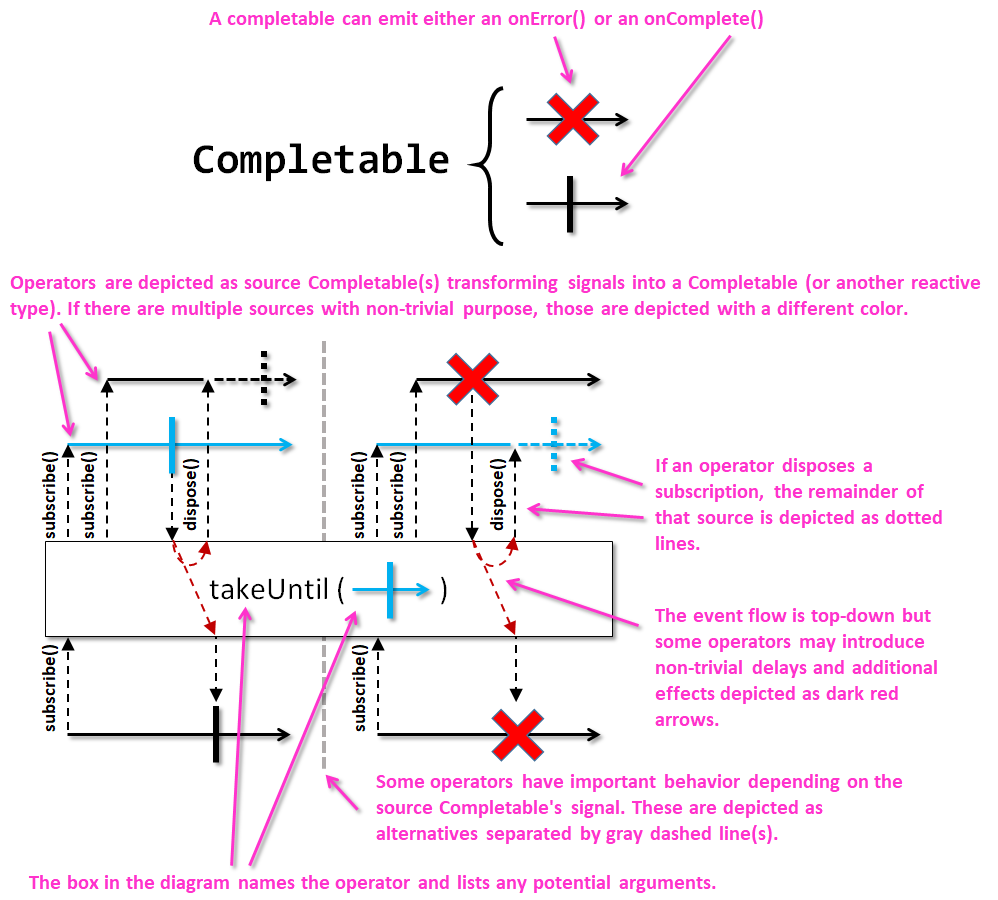 *
*
* See {@link Flowable} or {@link Observable} for the
* implementation of the Reactive Pattern for a stream or vector of values.
*
* Example:
*
* Disposable d = Completable.complete()
* .delay(10, TimeUnit.SECONDS, Schedulers.io())
* .subscribeWith(new DisposableCompletableObserver() {
* @Override
* public void onStart() {
* System.out.println("Started");
* }
*
* @Override
* public void onError(Throwable error) {
* error.printStackTrace();
* }
*
* @Override
* public void onComplete() {
* System.out.println("Done!");
* }
* });
*
* Thread.sleep(5000);
*
* d.dispose();
*
*
* Note that by design, subscriptions via {@link #subscribe(CompletableObserver)} can't be disposed
* from the outside (hence the
* {@code void} return of the {@link #subscribe(CompletableObserver)} method) and it is the
* responsibility of the implementor of the {@code CompletableObserver} to allow this to happen.
* RxJava supports such usage with the standard
* {@link io.reactivex.observers.DisposableCompletableObserver DisposableCompletableObserver} instance.
* For convenience, the {@link #subscribeWith(CompletableObserver)} method is provided as well to
* allow working with a {@code CompletableObserver} (or subclass) instance to be applied with in
* a fluent manner (such as in the example above).
*
* @see io.reactivex.observers.DisposableCompletableObserver
*/
public abstract class Completable implements CompletableSource {
/**
* Returns a Completable which terminates as soon as one of the source Completables
* terminates (normally or with an error) and disposes all other Completables.
*
* 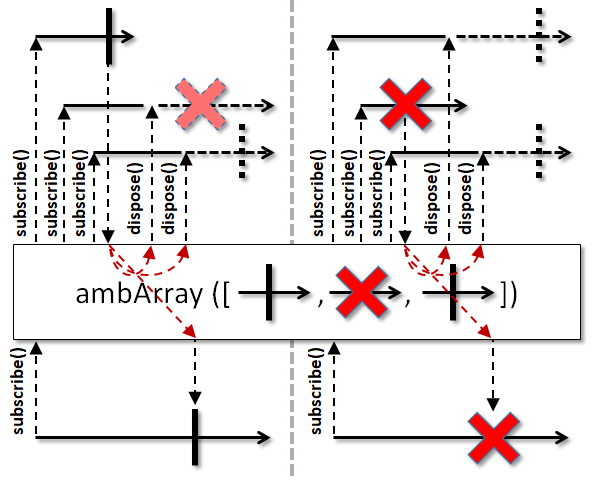 *
*
* - Scheduler:
* - {@code ambArray} does not operate by default on a particular {@link Scheduler}.
*
* @param sources the array of source Completables. A subscription to each source will
* occur in the same order as in this array.
* @return the new Completable instance
* @throws NullPointerException if sources is null
*/
@CheckReturnValue
@NonNull
@SchedulerSupport(SchedulerSupport.NONE)
public static Completable ambArray(final CompletableSource... sources) {
ObjectHelper.requireNonNull(sources, "sources is null");
if (sources.length == 0) {
return complete();
}
if (sources.length == 1) {
return wrap(sources[0]);
}
return RxJavaPlugins.onAssembly(new CompletableAmb(sources, null));
}
/**
* Returns a Completable which terminates as soon as one of the source Completables
* terminates (normally or with an error) and disposes all other Completables.
*
* 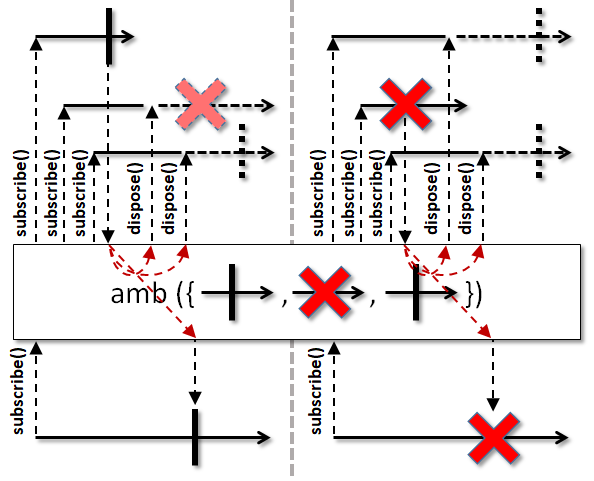 *
*
* - Scheduler:
* - {@code amb} does not operate by default on a particular {@link Scheduler}.
*
* @param sources the array of source Completables. A subscription to each source will
* occur in the same order as in this Iterable.
* @return the new Completable instance
* @throws NullPointerException if sources is null
*/
@CheckReturnValue
@NonNull
@SchedulerSupport(SchedulerSupport.NONE)
public static Completable amb(final Iterable sources) {
ObjectHelper.requireNonNull(sources, "sources is null");
return RxJavaPlugins.onAssembly(new CompletableAmb(null, sources));
}
/**
* Returns a Completable instance that completes immediately when subscribed to.
*
* 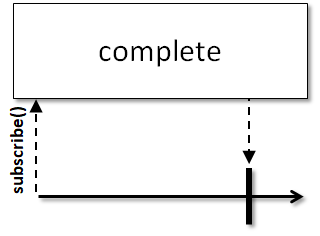 *
*
* - Scheduler:
* - {@code complete} does not operate by default on a particular {@link Scheduler}.
*
* @return a Completable instance that completes immediately
*/
@CheckReturnValue
@NonNull
@SchedulerSupport(SchedulerSupport.NONE)
public static Completable complete() {
return RxJavaPlugins.onAssembly(CompletableEmpty.INSTANCE);
}
/**
* Returns a Completable which completes only when all sources complete, one after another.
*
* 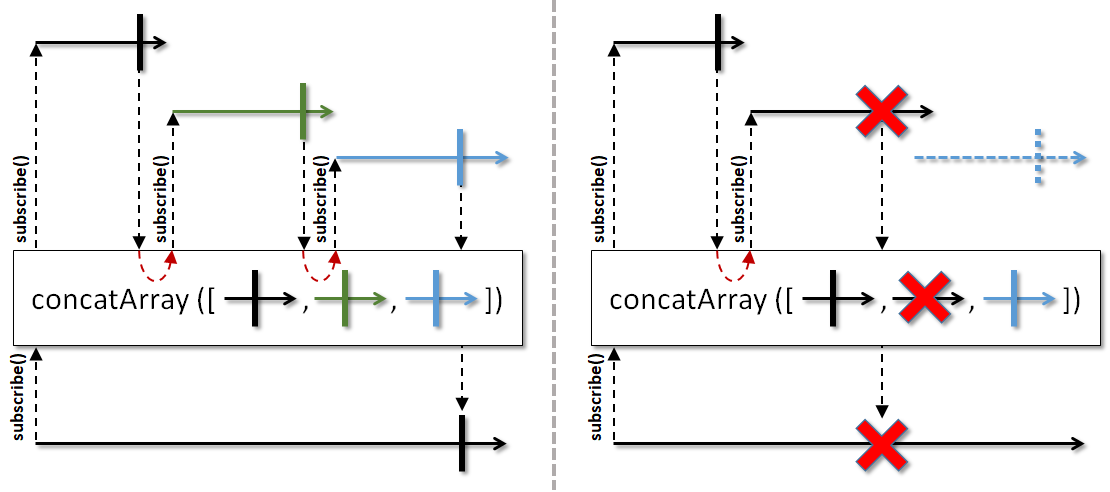 *
*
* - Scheduler:
* - {@code concatArray} does not operate by default on a particular {@link Scheduler}.
*
* @param sources the sources to concatenate
* @return the Completable instance which completes only when all sources complete
* @throws NullPointerException if sources is null
*/
@CheckReturnValue
@NonNull
@SchedulerSupport(SchedulerSupport.NONE)
public static Completable concatArray(CompletableSource... sources) {
ObjectHelper.requireNonNull(sources, "sources is null");
if (sources.length == 0) {
return complete();
} else
if (sources.length == 1) {
return wrap(sources[0]);
}
return RxJavaPlugins.onAssembly(new CompletableConcatArray(sources));
}
/**
* Returns a Completable which completes only when all sources complete, one after another.
*
* 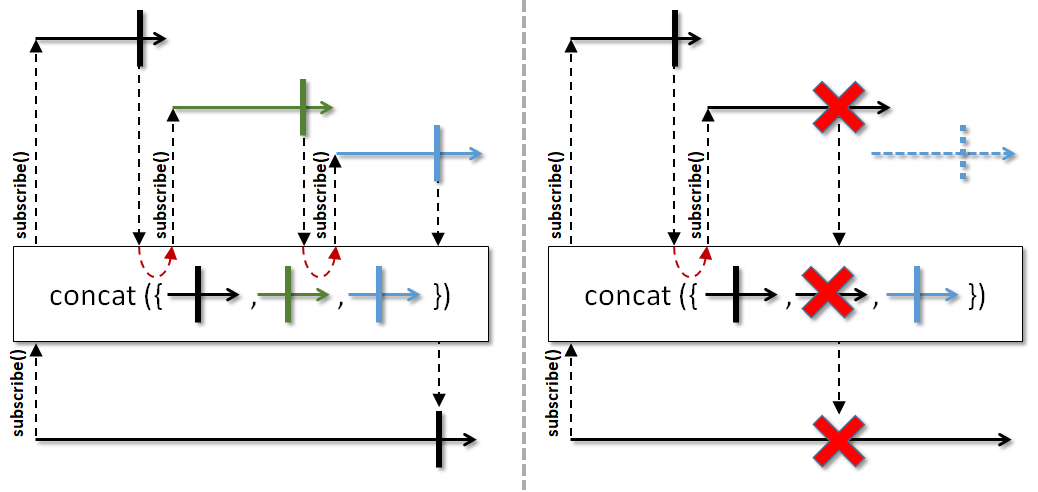 *
*
* - Scheduler:
* - {@code concat} does not operate by default on a particular {@link Scheduler}.
*
* @param sources the sources to concatenate
* @return the Completable instance which completes only when all sources complete
* @throws NullPointerException if sources is null
*/
@CheckReturnValue
@NonNull
@SchedulerSupport(SchedulerSupport.NONE)
public static Completable concat(Iterable sources) {
ObjectHelper.requireNonNull(sources, "sources is null");
return RxJavaPlugins.onAssembly(new CompletableConcatIterable(sources));
}
/**
* Returns a Completable which completes only when all sources complete, one after another.
*
* 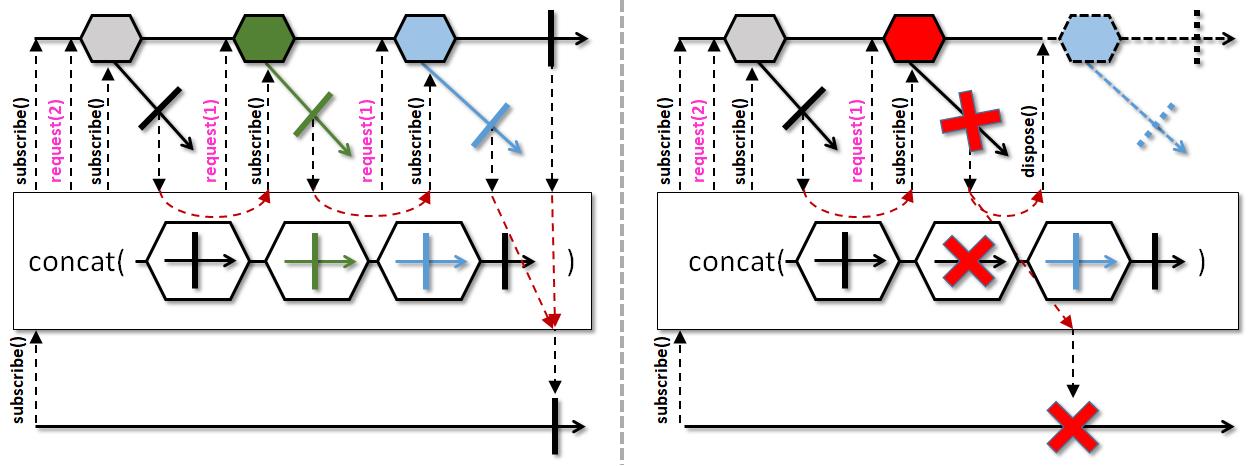 *
*
* - Backpressure:
* - The returned {@code Completable} honors the backpressure of the downstream consumer
* and expects the other {@code Publisher} to honor it as well.
* - Scheduler:
* - {@code concat} does not operate by default on a particular {@link Scheduler}.
*
* @param sources the sources to concatenate
* @return the Completable instance which completes only when all sources complete
* @throws NullPointerException if sources is null
*/
@CheckReturnValue
@SchedulerSupport(SchedulerSupport.NONE)
@BackpressureSupport(BackpressureKind.FULL)
public static Completable concat(Publisher sources) {
return concat(sources, 2);
}
/**
* Returns a Completable which completes only when all sources complete, one after another.
*
* 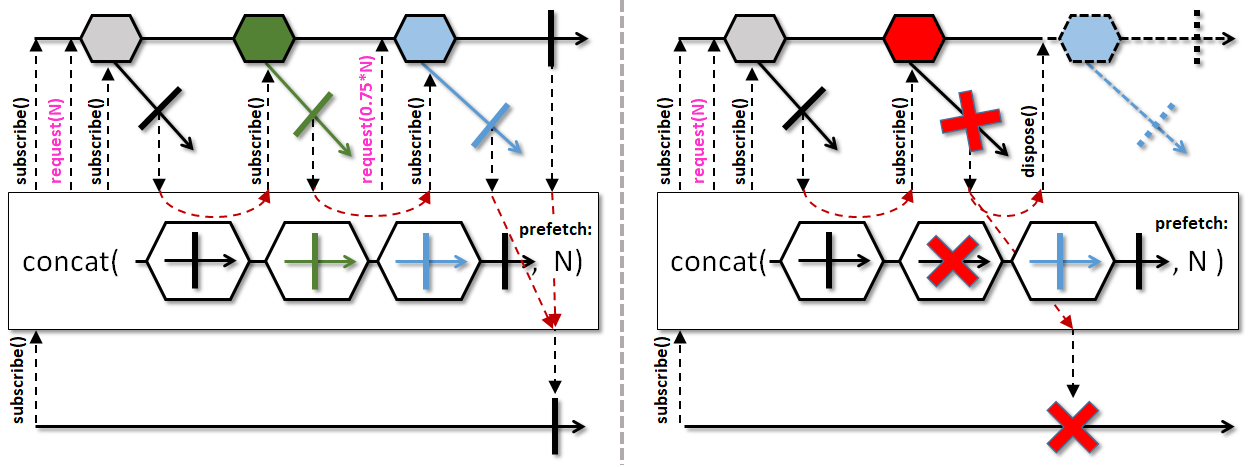 *
*
* - Backpressure:
* - The returned {@code Completable} honors the backpressure of the downstream consumer
* and expects the other {@code Publisher} to honor it as well.
* - Scheduler:
* - {@code concat} does not operate by default on a particular {@link Scheduler}.
*
* @param sources the sources to concatenate
* @param prefetch the number of sources to prefetch from the sources
* @return the Completable instance which completes only when all sources complete
* @throws NullPointerException if sources is null
*/
@CheckReturnValue
@NonNull
@SchedulerSupport(SchedulerSupport.NONE)
@BackpressureSupport(BackpressureKind.FULL)
public static Completable concat(Publisher sources, int prefetch) {
ObjectHelper.requireNonNull(sources, "sources is null");
ObjectHelper.verifyPositive(prefetch, "prefetch");
return RxJavaPlugins.onAssembly(new CompletableConcat(sources, prefetch));
}
/**
* Provides an API (via a cold Completable) that bridges the reactive world with the callback-style world.
*
* 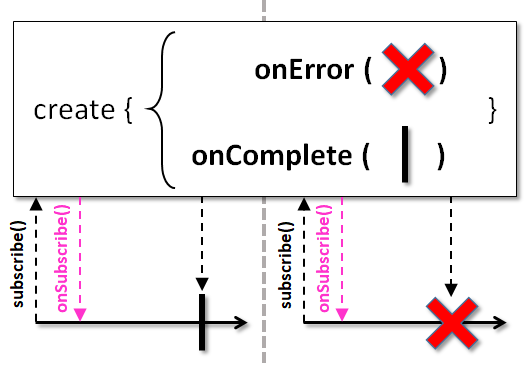 *
*
* Example:
*
* Completable.create(emitter -> {
* Callback listener = new Callback() {
* @Override
* public void onEvent(Event e) {
* emitter.onComplete();
* }
*
* @Override
* public void onFailure(Exception e) {
* emitter.onError(e);
* }
* };
*
* AutoCloseable c = api.someMethod(listener);
*
* emitter.setCancellable(c::close);
*
* });
*
*
* - Scheduler:
* - {@code create} does not operate by default on a particular {@link Scheduler}.
*
* @param source the emitter that is called when a CompletableObserver subscribes to the returned {@code Completable}
* @return the new Completable instance
* @see CompletableOnSubscribe
* @see Cancellable
*/
@CheckReturnValue
@NonNull
@SchedulerSupport(SchedulerSupport.NONE)
public static Completable create(CompletableOnSubscribe source) {
ObjectHelper.requireNonNull(source, "source is null");
return RxJavaPlugins.onAssembly(new CompletableCreate(source));
}
/**
* Constructs a Completable instance by wrapping the given source callback
* without any safeguards; you should manage the lifecycle and response
* to downstream disposal.
*
* 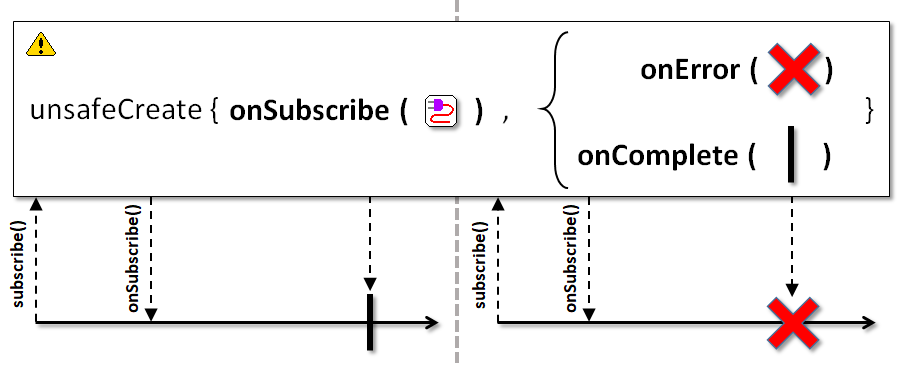 *
*
* - Scheduler:
* - {@code unsafeCreate} does not operate by default on a particular {@link Scheduler}.
*
* @param source the callback which will receive the CompletableObserver instances
* when the Completable is subscribed to.
* @return the created Completable instance
* @throws NullPointerException if source is null
*/
@CheckReturnValue
@NonNull
@SchedulerSupport(SchedulerSupport.NONE)
public static Completable unsafeCreate(CompletableSource source) {
ObjectHelper.requireNonNull(source, "source is null");
if (source instanceof Completable) {
throw new IllegalArgumentException("Use of unsafeCreate(Completable)!");
}
return RxJavaPlugins.onAssembly(new CompletableFromUnsafeSource(source));
}
/**
* Defers the subscription to a Completable instance returned by a supplier.
*
* 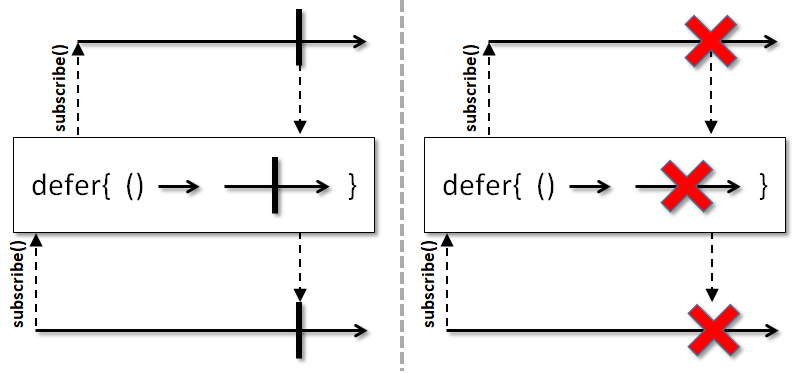 *
*
* - Scheduler:
* - {@code defer} does not operate by default on a particular {@link Scheduler}.
*
* @param completableSupplier the supplier that returns the Completable that will be subscribed to.
* @return the Completable instance
*/
@CheckReturnValue
@NonNull
@SchedulerSupport(SchedulerSupport.NONE)
public static Completable defer(final Callable completableSupplier) {
ObjectHelper.requireNonNull(completableSupplier, "completableSupplier");
return RxJavaPlugins.onAssembly(new CompletableDefer(completableSupplier));
}
/**
* Creates a Completable which calls the given error supplier for each subscriber
* and emits its returned Throwable.
*
* 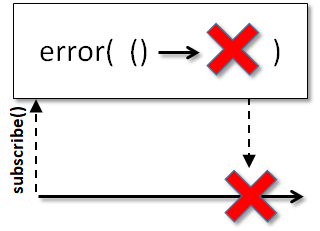 *
*
* If the errorSupplier returns null, the child CompletableObservers will receive a
* NullPointerException.
*
* - Scheduler:
* - {@code error} does not operate by default on a particular {@link Scheduler}.
*
* @param errorSupplier the error supplier, not null
* @return the new Completable instance
* @throws NullPointerException if errorSupplier is null
*/
@CheckReturnValue
@NonNull
@SchedulerSupport(SchedulerSupport.NONE)
public static Completable error(final Callable errorSupplier) {
ObjectHelper.requireNonNull(errorSupplier, "errorSupplier is null");
return RxJavaPlugins.onAssembly(new CompletableErrorSupplier(errorSupplier));
}
/**
* Creates a Completable instance that emits the given Throwable exception to subscribers.
*
* 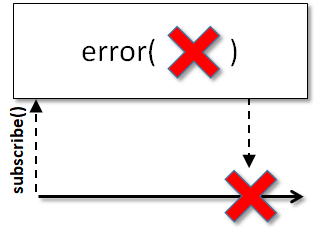 *
*
* - Scheduler:
* - {@code error} does not operate by default on a particular {@link Scheduler}.
*
* @param error the Throwable instance to emit, not null
* @return the new Completable instance
* @throws NullPointerException if error is null
*/
@CheckReturnValue
@NonNull
@SchedulerSupport(SchedulerSupport.NONE)
public static Completable error(final Throwable error) {
ObjectHelper.requireNonNull(error, "error is null");
return RxJavaPlugins.onAssembly(new CompletableError(error));
}
/**
* Returns a Completable instance that runs the given Action for each subscriber and
* emits either an unchecked exception or simply completes.
*
* 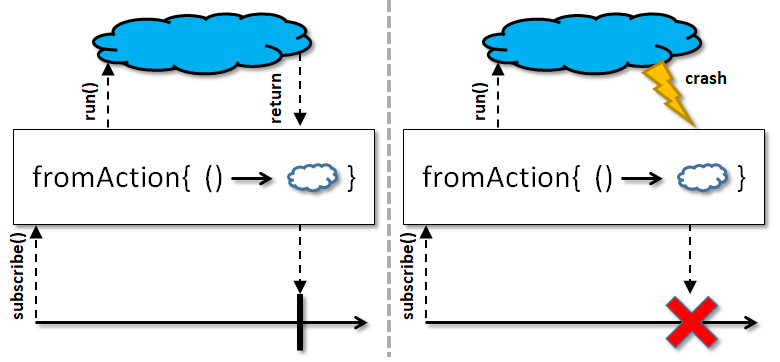 *
*
* - Scheduler:
* - {@code fromAction} does not operate by default on a particular {@link Scheduler}.
* - Error handling:
* - If the {@link Action} throws an exception, the respective {@link Throwable} is
* delivered to the downstream via {@link CompletableObserver#onError(Throwable)},
* except when the downstream has disposed this {@code Completable} source.
* In this latter case, the {@code Throwable} is delivered to the global error handler via
* {@link RxJavaPlugins#onError(Throwable)} as an {@link io.reactivex.exceptions.UndeliverableException UndeliverableException}.
*
*
* @param run the runnable to run for each subscriber
* @return the new Completable instance
* @throws NullPointerException if run is null
*/
@CheckReturnValue
@NonNull
@SchedulerSupport(SchedulerSupport.NONE)
public static Completable fromAction(final Action run) {
ObjectHelper.requireNonNull(run, "run is null");
return RxJavaPlugins.onAssembly(new CompletableFromAction(run));
}
/**
* Returns a Completable which when subscribed, executes the callable function, ignores its
* normal result and emits onError or onComplete only.
*
* 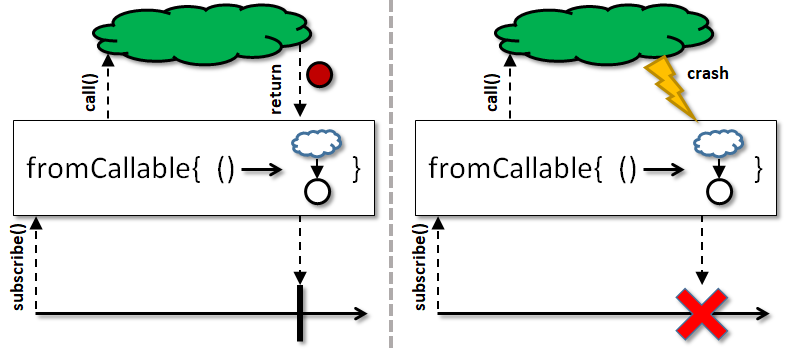 *
*
* - Scheduler:
* - {@code fromCallable} does not operate by default on a particular {@link Scheduler}.
* - Error handling:
* - If the {@link Callable} throws an exception, the respective {@link Throwable} is
* delivered to the downstream via {@link CompletableObserver#onError(Throwable)},
* except when the downstream has disposed this {@code Completable} source.
* In this latter case, the {@code Throwable} is delivered to the global error handler via
* {@link RxJavaPlugins#onError(Throwable)} as an {@link io.reactivex.exceptions.UndeliverableException UndeliverableException}.
*
*
* @param callable the callable instance to execute for each subscriber
* @return the new Completable instance
*/
@CheckReturnValue
@NonNull
@SchedulerSupport(SchedulerSupport.NONE)
public static Completable fromCallable(final Callable callable) {
ObjectHelper.requireNonNull(callable, "callable is null");
return RxJavaPlugins.onAssembly(new CompletableFromCallable(callable));
}
/**
* Returns a Completable instance that reacts to the termination of the given Future in a blocking fashion.
*
* 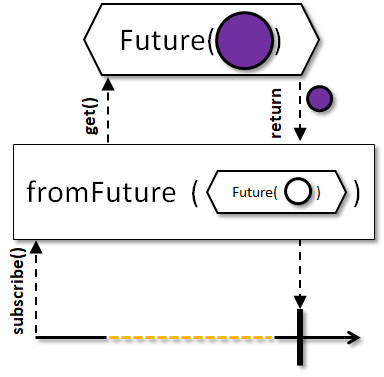 *
*
* Note that if any of the observers to this Completable call dispose, this Completable will cancel the future.
*
* - Scheduler:
* - {@code fromFuture} does not operate by default on a particular {@link Scheduler}.
*
* @param future the future to react to
* @return the new Completable instance
*/
@CheckReturnValue
@NonNull
@SchedulerSupport(SchedulerSupport.NONE)
public static Completable fromFuture(final Future future) {
ObjectHelper.requireNonNull(future, "future is null");
return fromAction(Functions.futureAction(future));
}
/**
* Returns a Completable instance that when subscribed to, subscribes to the {@code Maybe} instance and
* emits a completion event if the maybe emits {@code onSuccess}/{@code onComplete} or forwards any
* {@code onError} events.
*
* 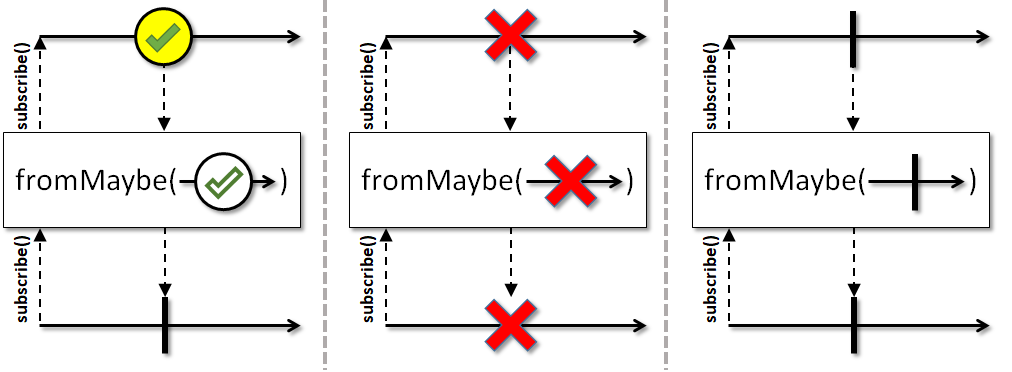 *
*
* - Scheduler:
* - {@code fromMaybe} does not operate by default on a particular {@link Scheduler}.
*
* History: 2.1.17 - beta
* @param the value type of the {@link MaybeSource} element
* @param maybe the Maybe instance to subscribe to, not null
* @return the new Completable instance
* @throws NullPointerException if single is null
* @since 2.2
*/
@CheckReturnValue
@NonNull
@SchedulerSupport(SchedulerSupport.NONE)
public static Completable fromMaybe(final MaybeSource maybe) {
ObjectHelper.requireNonNull(maybe, "maybe is null");
return RxJavaPlugins.onAssembly(new MaybeIgnoreElementCompletable(maybe));
}
/**
* Returns a Completable instance that runs the given Runnable for each subscriber and
* emits either its exception or simply completes.
*
* 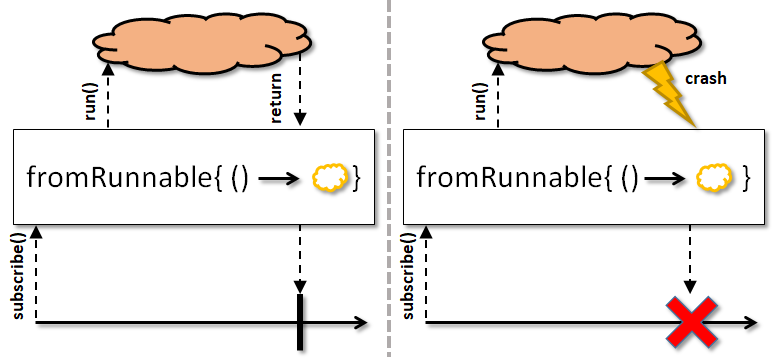 *
*
* - Scheduler:
* - {@code fromRunnable} does not operate by default on a particular {@link Scheduler}.
* - Error handling:
* - If the {@link Runnable} throws an exception, the respective {@link Throwable} is
* delivered to the downstream via {@link CompletableObserver#onError(Throwable)},
* except when the downstream has disposed this {@code Completable} source.
* In this latter case, the {@code Throwable} is delivered to the global error handler via
* {@link RxJavaPlugins#onError(Throwable)} as an {@link io.reactivex.exceptions.UndeliverableException UndeliverableException}.
*
*
* @param run the runnable to run for each subscriber
* @return the new Completable instance
* @throws NullPointerException if run is null
*/
@CheckReturnValue
@NonNull
@SchedulerSupport(SchedulerSupport.NONE)
public static Completable fromRunnable(final Runnable run) {
ObjectHelper.requireNonNull(run, "run is null");
return RxJavaPlugins.onAssembly(new CompletableFromRunnable(run));
}
/**
* Returns a Completable instance that subscribes to the given Observable, ignores all values and
* emits only the terminal event.
*
* 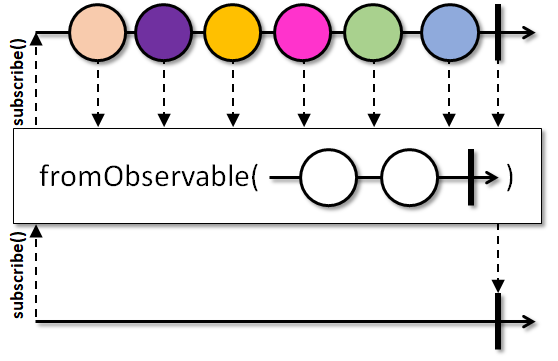 *
*
* - Scheduler:
* - {@code fromObservable} does not operate by default on a particular {@link Scheduler}.
*
* @param the type of the Observable
* @param observable the Observable instance to subscribe to, not null
* @return the new Completable instance
* @throws NullPointerException if flowable is null
*/
@CheckReturnValue
@NonNull
@SchedulerSupport(SchedulerSupport.NONE)
public static Completable fromObservable(final ObservableSource observable) {
ObjectHelper.requireNonNull(observable, "observable is null");
return RxJavaPlugins.onAssembly(new CompletableFromObservable(observable));
}
/**
* Returns a Completable instance that subscribes to the given publisher, ignores all values and
* emits only the terminal event.
*
* 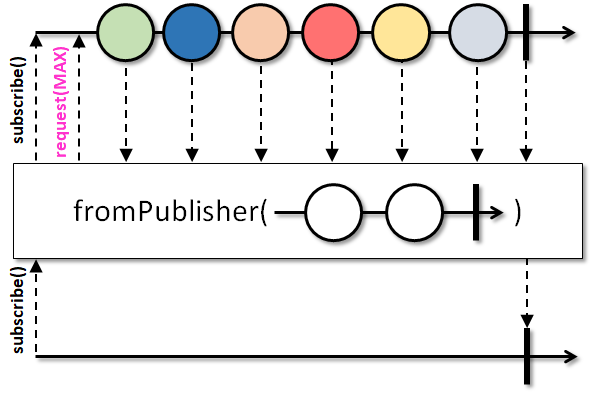 *
*
* The {@link Publisher} must follow the
* Reactive Streams specification.
* Violating the specification may result in undefined behavior.
*
* If possible, use {@link #create(CompletableOnSubscribe)} to create a
* source-like {@code Completable} instead.
*
* Note that even though {@link Publisher} appears to be a functional interface, it
* is not recommended to implement it through a lambda as the specification requires
* state management that is not achievable with a stateless lambda.
*
* - Backpressure:
* - The returned {@code Completable} honors the backpressure of the downstream consumer
* and expects the other {@code Publisher} to honor it as well.
* - Scheduler:
* - {@code fromPublisher} does not operate by default on a particular {@link Scheduler}.
*
* @param the type of the publisher
* @param publisher the Publisher instance to subscribe to, not null
* @return the new Completable instance
* @throws NullPointerException if publisher is null
* @see #create(CompletableOnSubscribe)
*/
@CheckReturnValue
@NonNull
@BackpressureSupport(BackpressureKind.UNBOUNDED_IN)
@SchedulerSupport(SchedulerSupport.NONE)
public static Completable fromPublisher(final Publisher publisher) {
ObjectHelper.requireNonNull(publisher, "publisher is null");
return RxJavaPlugins.onAssembly(new CompletableFromPublisher(publisher));
}
/**
* Returns a Completable instance that when subscribed to, subscribes to the Single instance and
* emits a completion event if the single emits onSuccess or forwards any onError events.
*
* 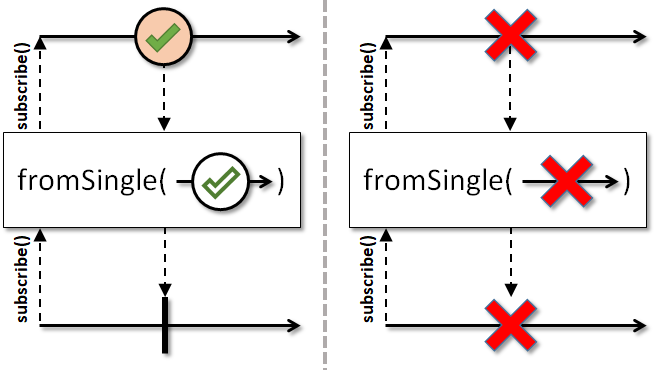 *
*
* - Scheduler:
* - {@code fromSingle} does not operate by default on a particular {@link Scheduler}.
*
* @param the value type of the Single
* @param single the Single instance to subscribe to, not null
* @return the new Completable instance
* @throws NullPointerException if single is null
*/
@CheckReturnValue
@NonNull
@SchedulerSupport(SchedulerSupport.NONE)
public static Completable fromSingle(final SingleSource single) {
ObjectHelper.requireNonNull(single, "single is null");
return RxJavaPlugins.onAssembly(new CompletableFromSingle(single));
}
/**
* Returns a Completable instance that subscribes to all sources at once and
* completes only when all source Completables complete or one of them emits an error.
*
* 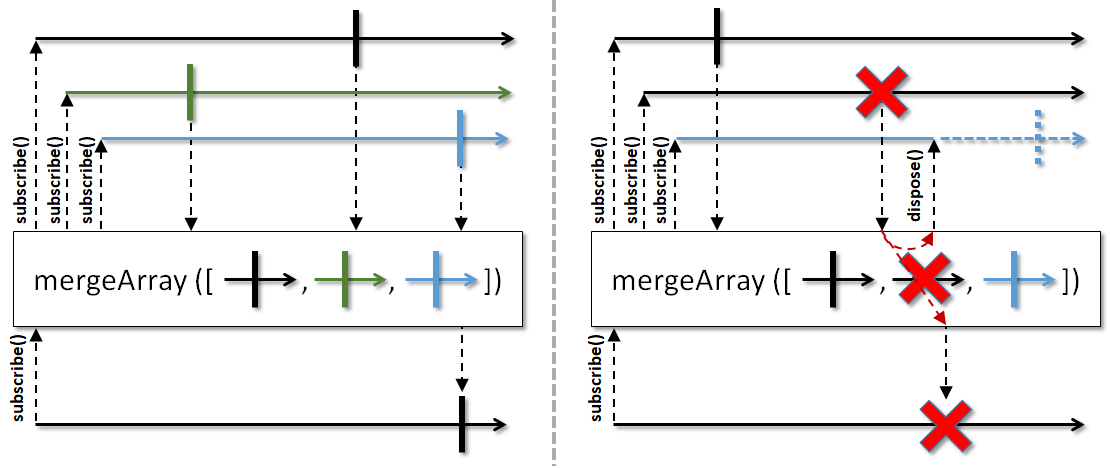 *
*
* - Scheduler:
* - {@code mergeArray} does not operate by default on a particular {@link Scheduler}.
* - Error handling:
* - If any of the source {@code CompletableSource}s signal a {@code Throwable} via {@code onError}, the resulting
* {@code Completable} terminates with that {@code Throwable} and all other source {@code CompletableSource}s are disposed.
* If more than one {@code CompletableSource} signals an error, the resulting {@code Completable} may terminate with the
* first one's error or, depending on the concurrency of the sources, may terminate with a
* {@code CompositeException} containing two or more of the various error signals.
* {@code Throwable}s that didn't make into the composite will be sent (individually) to the global error handler via
* {@link RxJavaPlugins#onError(Throwable)} method as {@code UndeliverableException} errors. Similarly, {@code Throwable}s
* signaled by source(s) after the returned {@code Completable} has been disposed or terminated with a
* (composite) error will be sent to the same global error handler.
* Use {@link #mergeArrayDelayError(CompletableSource...)} to merge sources and terminate only when all source {@code CompletableSource}s
* have completed or failed with an error.
*
*
* @param sources the iterable sequence of sources.
* @return the new Completable instance
* @throws NullPointerException if sources is null
* @see #mergeArrayDelayError(CompletableSource...)
*/
@CheckReturnValue
@NonNull
@SchedulerSupport(SchedulerSupport.NONE)
public static Completable mergeArray(CompletableSource... sources) {
ObjectHelper.requireNonNull(sources, "sources is null");
if (sources.length == 0) {
return complete();
} else
if (sources.length == 1) {
return wrap(sources[0]);
}
return RxJavaPlugins.onAssembly(new CompletableMergeArray(sources));
}
/**
* Returns a Completable instance that subscribes to all sources at once and
* completes only when all source Completables complete or one of them emits an error.
*
* 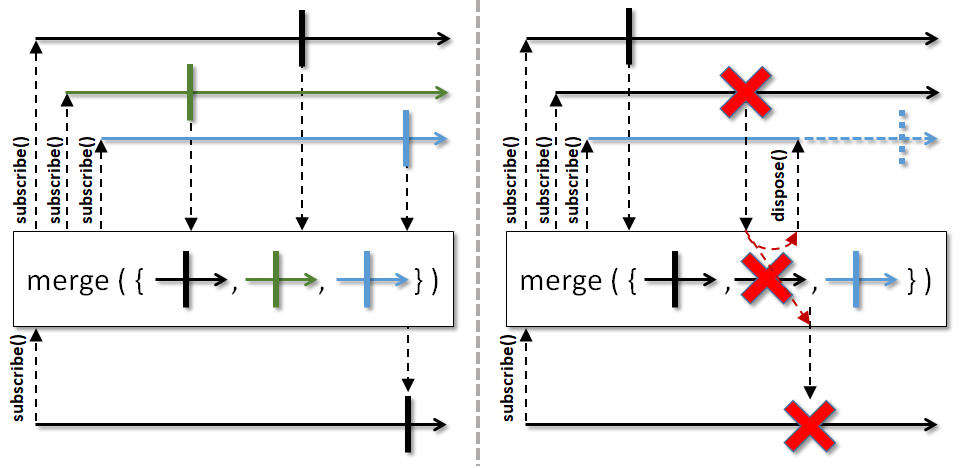 *
*
* - Scheduler:
* - {@code merge} does not operate by default on a particular {@link Scheduler}.
* - Error handling:
* - If any of the source {@code CompletableSource}s signal a {@code Throwable} via {@code onError}, the resulting
* {@code Completable} terminates with that {@code Throwable} and all other source {@code CompletableSource}s are disposed.
* If more than one {@code CompletableSource} signals an error, the resulting {@code Completable} may terminate with the
* first one's error or, depending on the concurrency of the sources, may terminate with a
* {@code CompositeException} containing two or more of the various error signals.
* {@code Throwable}s that didn't make into the composite will be sent (individually) to the global error handler via
* {@link RxJavaPlugins#onError(Throwable)} method as {@code UndeliverableException} errors. Similarly, {@code Throwable}s
* signaled by source(s) after the returned {@code Completable} has been disposed or terminated with a
* (composite) error will be sent to the same global error handler.
* Use {@link #mergeDelayError(Iterable)} to merge sources and terminate only when all source {@code CompletableSource}s
* have completed or failed with an error.
*
*
* @param sources the iterable sequence of sources.
* @return the new Completable instance
* @throws NullPointerException if sources is null
* @see #mergeDelayError(Iterable)
*/
@CheckReturnValue
@NonNull
@SchedulerSupport(SchedulerSupport.NONE)
public static Completable merge(Iterable sources) {
ObjectHelper.requireNonNull(sources, "sources is null");
return RxJavaPlugins.onAssembly(new CompletableMergeIterable(sources));
}
/**
* Returns a Completable instance that subscribes to all sources at once and
* completes only when all source Completables complete or one of them emits an error.
*
*  *
*
* - Backpressure:
* - The returned {@code Completable} honors the backpressure of the downstream consumer
* and expects the other {@code Publisher} to honor it as well.
* - Scheduler:
* - {@code merge} does not operate by default on a particular {@link Scheduler}.
* - Error handling:
* - If any of the source {@code CompletableSource}s signal a {@code Throwable} via {@code onError}, the resulting
* {@code Completable} terminates with that {@code Throwable} and all other source {@code CompletableSource}s are disposed.
* If more than one {@code CompletableSource} signals an error, the resulting {@code Completable} may terminate with the
* first one's error or, depending on the concurrency of the sources, may terminate with a
* {@code CompositeException} containing two or more of the various error signals.
* {@code Throwable}s that didn't make into the composite will be sent (individually) to the global error handler via
* {@link RxJavaPlugins#onError(Throwable)} method as {@code UndeliverableException} errors. Similarly, {@code Throwable}s
* signaled by source(s) after the returned {@code Completable} has been disposed or terminated with a
* (composite) error will be sent to the same global error handler.
* Use {@link #mergeDelayError(Publisher)} to merge sources and terminate only when all source {@code CompletableSource}s
* have completed or failed with an error.
*
*
* @param sources the iterable sequence of sources.
* @return the new Completable instance
* @throws NullPointerException if sources is null
* @see #mergeDelayError(Publisher)
*/
@CheckReturnValue
@SchedulerSupport(SchedulerSupport.NONE)
@BackpressureSupport(BackpressureKind.UNBOUNDED_IN)
public static Completable merge(Publisher sources) {
return merge0(sources, Integer.MAX_VALUE, false);
}
/**
* Returns a Completable instance that keeps subscriptions to a limited number of sources at once and
* completes only when all source Completables complete or one of them emits an error.
*
* 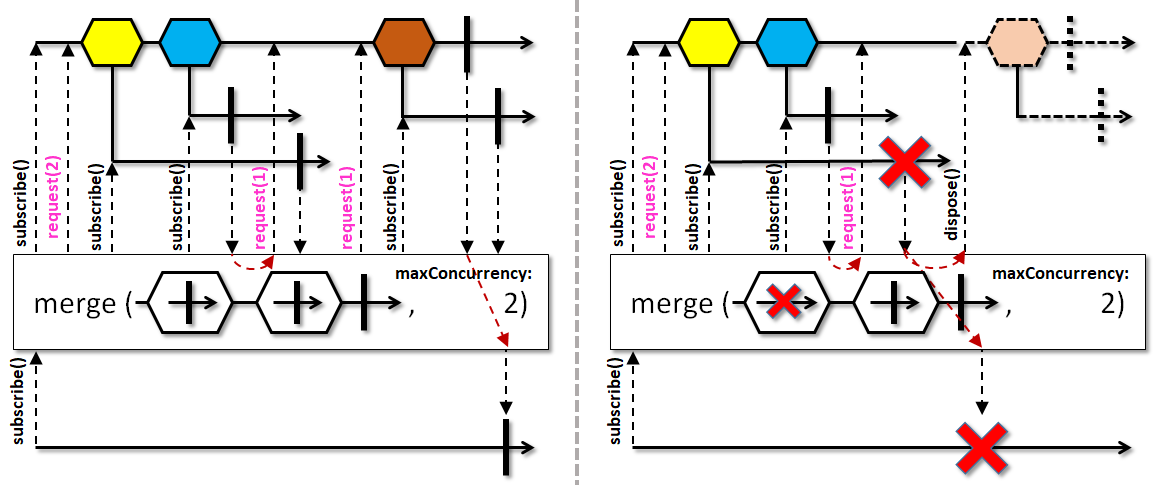 *
*
* - Backpressure:
* - The returned {@code Completable} honors the backpressure of the downstream consumer
* and expects the other {@code Publisher} to honor it as well.
* - Scheduler:
* - {@code merge} does not operate by default on a particular {@link Scheduler}.
* - Error handling:
* - If any of the source {@code CompletableSource}s signal a {@code Throwable} via {@code onError}, the resulting
* {@code Completable} terminates with that {@code Throwable} and all other source {@code CompletableSource}s are disposed.
* If more than one {@code CompletableSource} signals an error, the resulting {@code Completable} may terminate with the
* first one's error or, depending on the concurrency of the sources, may terminate with a
* {@code CompositeException} containing two or more of the various error signals.
* {@code Throwable}s that didn't make into the composite will be sent (individually) to the global error handler via
* {@link RxJavaPlugins#onError(Throwable)} method as {@code UndeliverableException} errors. Similarly, {@code Throwable}s
* signaled by source(s) after the returned {@code Completable} has been disposed or terminated with a
* (composite) error will be sent to the same global error handler.
* Use {@link #mergeDelayError(Publisher, int)} to merge sources and terminate only when all source {@code CompletableSource}s
* have completed or failed with an error.
*
*
* @param sources the iterable sequence of sources.
* @param maxConcurrency the maximum number of concurrent subscriptions
* @return the new Completable instance
* @throws NullPointerException if sources is null
* @throws IllegalArgumentException if maxConcurrency is less than 1
* @see #mergeDelayError(Publisher, int)
*/
@CheckReturnValue
@SchedulerSupport(SchedulerSupport.NONE)
@BackpressureSupport(BackpressureKind.FULL)
public static Completable merge(Publisher sources, int maxConcurrency) {
return merge0(sources, maxConcurrency, false);
}
/**
* Returns a Completable instance that keeps subscriptions to a limited number of sources at once and
* completes only when all source Completables terminate in one way or another, combining any exceptions
* thrown by either the sources Observable or the inner Completable instances.
*
* - Backpressure:
* - The returned {@code Flowable} honors the backpressure of the downstream consumer
* and expects the other {@code Publisher} to honor it as well.
*
- Scheduler:
* - {@code merge0} does not operate by default on a particular {@link Scheduler}.
*
* @param sources the iterable sequence of sources.
* @param maxConcurrency the maximum number of concurrent subscriptions
* @param delayErrors delay all errors from the main source and from the inner Completables?
* @return the new Completable instance
* @throws NullPointerException if sources is null
* @throws IllegalArgumentException if maxConcurrency is less than 1
*/
@CheckReturnValue
@NonNull
@SchedulerSupport(SchedulerSupport.NONE)
@BackpressureSupport(BackpressureKind.FULL)
private static Completable merge0(Publisher sources, int maxConcurrency, boolean delayErrors) {
ObjectHelper.requireNonNull(sources, "sources is null");
ObjectHelper.verifyPositive(maxConcurrency, "maxConcurrency");
return RxJavaPlugins.onAssembly(new CompletableMerge(sources, maxConcurrency, delayErrors));
}
/**
* Returns a CompletableConsumable that subscribes to all Completables in the source array and delays
* any error emitted by either the sources observable or any of the inner Completables until all of
* them terminate in a way or another.
*
* 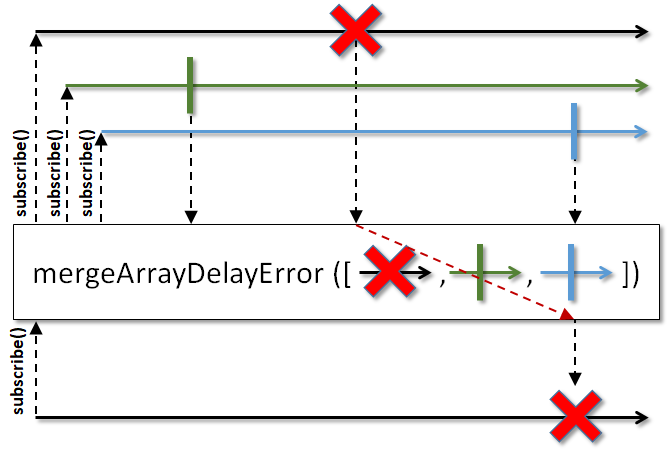 *
*
* - Scheduler:
* - {@code mergeArrayDelayError} does not operate by default on a particular {@link Scheduler}.
*
* @param sources the array of Completables
* @return the new Completable instance
* @throws NullPointerException if sources is null
*/
@CheckReturnValue
@NonNull
@SchedulerSupport(SchedulerSupport.NONE)
public static Completable mergeArrayDelayError(CompletableSource... sources) {
ObjectHelper.requireNonNull(sources, "sources is null");
return RxJavaPlugins.onAssembly(new CompletableMergeDelayErrorArray(sources));
}
/**
* Returns a Completable that subscribes to all Completables in the source sequence and delays
* any error emitted by either the sources observable or any of the inner Completables until all of
* them terminate in a way or another.
*
* 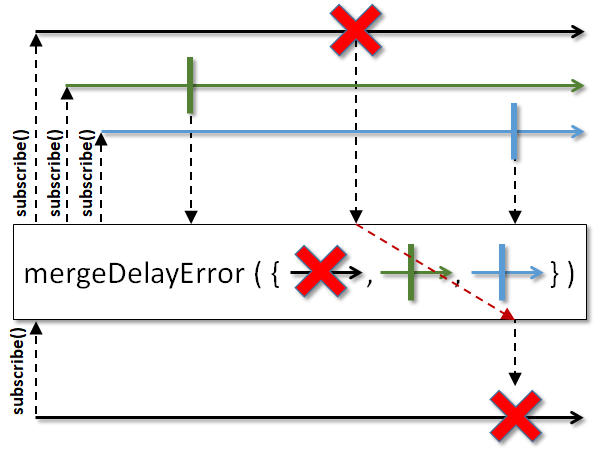 *
*
* - Scheduler:
* - {@code mergeDelayError} does not operate by default on a particular {@link Scheduler}.
*
* @param sources the sequence of Completables
* @return the new Completable instance
* @throws NullPointerException if sources is null
*/
@CheckReturnValue
@NonNull
@SchedulerSupport(SchedulerSupport.NONE)
public static Completable mergeDelayError(Iterable sources) {
ObjectHelper.requireNonNull(sources, "sources is null");
return RxJavaPlugins.onAssembly(new CompletableMergeDelayErrorIterable(sources));
}
/**
* Returns a Completable that subscribes to all Completables in the source sequence and delays
* any error emitted by either the sources observable or any of the inner Completables until all of
* them terminate in a way or another.
*
* 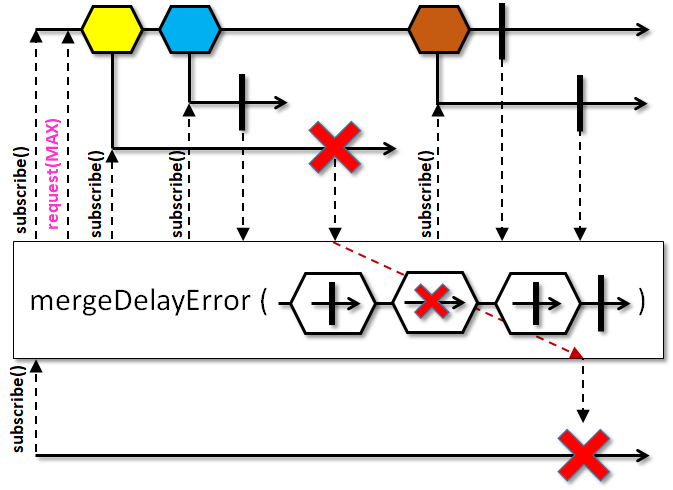 *
*
* - Backpressure:
* - The returned {@code Completable} honors the backpressure of the downstream consumer
* and expects the other {@code Publisher} to honor it as well.
* - Scheduler:
* - {@code mergeDelayError} does not operate by default on a particular {@link Scheduler}.
*
* @param sources the sequence of Completables
* @return the new Completable instance
* @throws NullPointerException if sources is null
*/
@CheckReturnValue
@SchedulerSupport(SchedulerSupport.NONE)
@BackpressureSupport(BackpressureKind.UNBOUNDED_IN)
public static Completable mergeDelayError(Publisher sources) {
return merge0(sources, Integer.MAX_VALUE, true);
}
/**
* Returns a Completable that subscribes to a limited number of inner Completables at once in
* the source sequence and delays any error emitted by either the sources
* observable or any of the inner Completables until all of
* them terminate in a way or another.
*
* 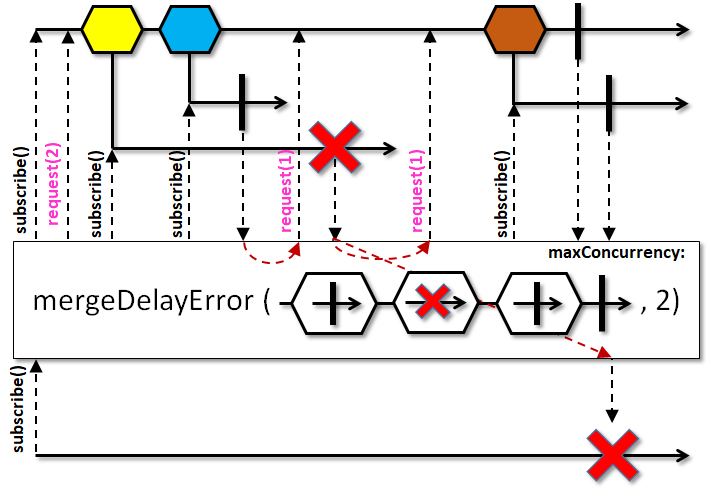 *
*
* - Backpressure:
* - The returned {@code Completable} honors the backpressure of the downstream consumer
* and expects the other {@code Publisher} to honor it as well.
* - Scheduler:
* - {@code mergeDelayError} does not operate by default on a particular {@link Scheduler}.
*
* @param sources the sequence of Completables
* @param maxConcurrency the maximum number of concurrent subscriptions to Completables
* @return the new Completable instance
* @throws NullPointerException if sources is null
*/
@CheckReturnValue
@SchedulerSupport(SchedulerSupport.NONE)
@BackpressureSupport(BackpressureKind.FULL)
public static Completable mergeDelayError(Publisher sources, int maxConcurrency) {
return merge0(sources, maxConcurrency, true);
}
/**
* Returns a Completable that never calls onError or onComplete.
*
* 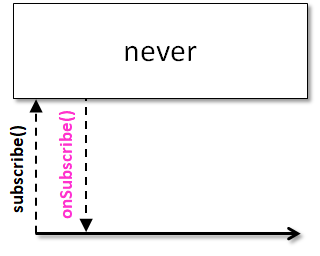 *
*
* - Scheduler:
* - {@code never} does not operate by default on a particular {@link Scheduler}.
*
* @return the singleton instance that never calls onError or onComplete
*/
@CheckReturnValue
@SchedulerSupport(SchedulerSupport.NONE)
public static Completable never() {
return RxJavaPlugins.onAssembly(CompletableNever.INSTANCE);
}
/**
* Returns a Completable instance that fires its onComplete event after the given delay elapsed.
*
* 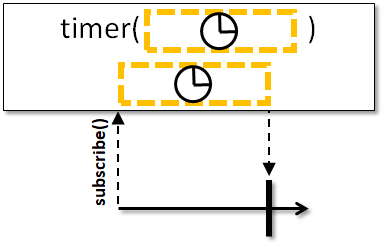 *
*
* - Scheduler:
* - {@code timer} does operate by default on the {@code computation} {@link Scheduler}.
*
* @param delay the delay time
* @param unit the delay unit
* @return the new Completable instance
*/
@CheckReturnValue
@SchedulerSupport(SchedulerSupport.COMPUTATION)
public static Completable timer(long delay, TimeUnit unit) {
return timer(delay, unit, Schedulers.computation());
}
/**
* Returns a Completable instance that fires its onComplete event after the given delay elapsed
* by using the supplied scheduler.
*
* 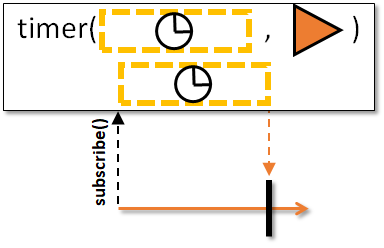 *
*
* - Scheduler:
* - {@code timer} operates on the {@link Scheduler} you specify.
*
* @param delay the delay time
* @param unit the delay unit
* @param scheduler the scheduler where to emit the complete event
* @return the new Completable instance
*/
@CheckReturnValue
@NonNull
@SchedulerSupport(SchedulerSupport.CUSTOM)
public static Completable timer(final long delay, final TimeUnit unit, final Scheduler scheduler) {
ObjectHelper.requireNonNull(unit, "unit is null");
ObjectHelper.requireNonNull(scheduler, "scheduler is null");
return RxJavaPlugins.onAssembly(new CompletableTimer(delay, unit, scheduler));
}
/**
* Creates a NullPointerException instance and sets the given Throwable as its initial cause.
* @param ex the Throwable instance to use as cause, not null (not verified)
* @return the created NullPointerException
*/
private static NullPointerException toNpe(Throwable ex) {
NullPointerException npe = new NullPointerException("Actually not, but can't pass out an exception otherwise...");
npe.initCause(ex);
return npe;
}
/**
* Returns a Completable instance which manages a resource along
* with a custom Completable instance while the subscription is active.
*
* 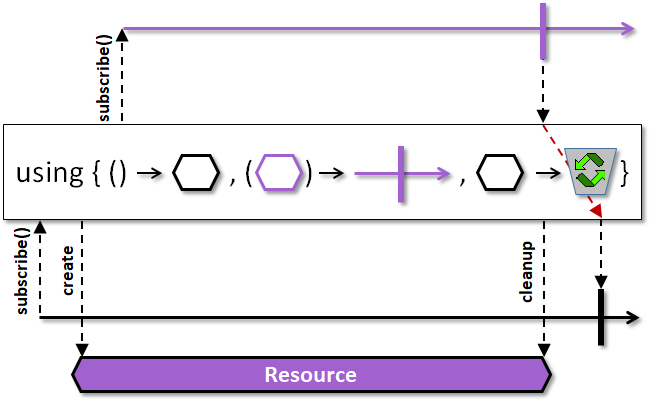 *
*
* This overload disposes eagerly before the terminal event is emitted.
*
* - Scheduler:
* - {@code using} does not operate by default on a particular {@link Scheduler}.
*
* @param the resource type
* @param resourceSupplier the supplier that returns a resource to be managed.
* @param completableFunction the function that given a resource returns a Completable instance that will be subscribed to
* @param disposer the consumer that disposes the resource created by the resource supplier
* @return the new Completable instance
*/
@CheckReturnValue
@SchedulerSupport(SchedulerSupport.NONE)
public static Completable using(Callable resourceSupplier,
Function completableFunction,
Consumer disposer) {
return using(resourceSupplier, completableFunction, disposer, true);
}
/**
* Returns a Completable instance which manages a resource along
* with a custom Completable instance while the subscription is active and performs eager or lazy
* resource disposition.
*
* 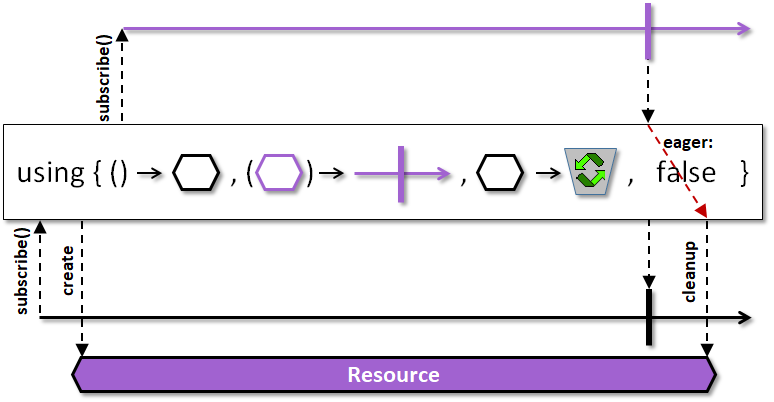 *
*
* If this overload performs a lazy disposal after the terminal event is emitted.
* Exceptions thrown at this time will be delivered to RxJavaPlugins only.
*
* - Scheduler:
* - {@code using} does not operate by default on a particular {@link Scheduler}.
*
* @param the resource type
* @param resourceSupplier the supplier that returns a resource to be managed
* @param completableFunction the function that given a resource returns a non-null
* Completable instance that will be subscribed to
* @param disposer the consumer that disposes the resource created by the resource supplier
* @param eager if true, the resource is disposed before the terminal event is emitted, if false, the
* resource is disposed after the terminal event has been emitted
* @return the new Completable instance
*/
@CheckReturnValue
@NonNull
@SchedulerSupport(SchedulerSupport.NONE)
public static Completable using(
final Callable resourceSupplier,
final Function completableFunction,
final Consumer disposer,
final boolean eager) {
ObjectHelper.requireNonNull(resourceSupplier, "resourceSupplier is null");
ObjectHelper.requireNonNull(completableFunction, "completableFunction is null");
ObjectHelper.requireNonNull(disposer, "disposer is null");
return RxJavaPlugins.onAssembly(new CompletableUsing(resourceSupplier, completableFunction, disposer, eager));
}
/**
* Wraps the given CompletableSource into a Completable
* if not already Completable.
*
* 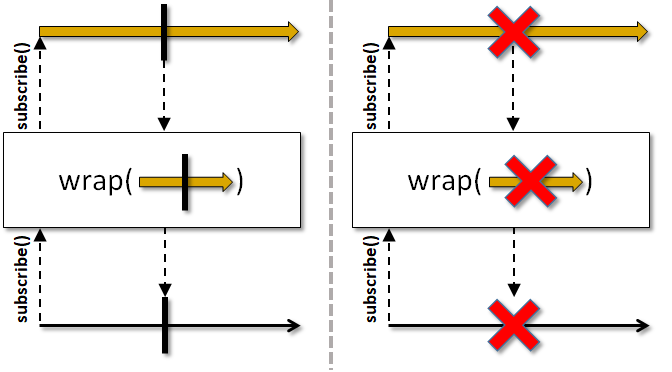 *
*
* - Scheduler:
* - {@code wrap} does not operate by default on a particular {@link Scheduler}.
*
* @param source the source to wrap
* @return the source or its wrapper Completable
* @throws NullPointerException if source is null
*/
@CheckReturnValue
@NonNull
@SchedulerSupport(SchedulerSupport.NONE)
public static Completable wrap(CompletableSource source) {
ObjectHelper.requireNonNull(source, "source is null");
if (source instanceof Completable) {
return RxJavaPlugins.onAssembly((Completable)source);
}
return RxJavaPlugins.onAssembly(new CompletableFromUnsafeSource(source));
}
/**
* Returns a Completable that emits the a terminated event of either this Completable
* or the other Completable whichever fires first.
*
* 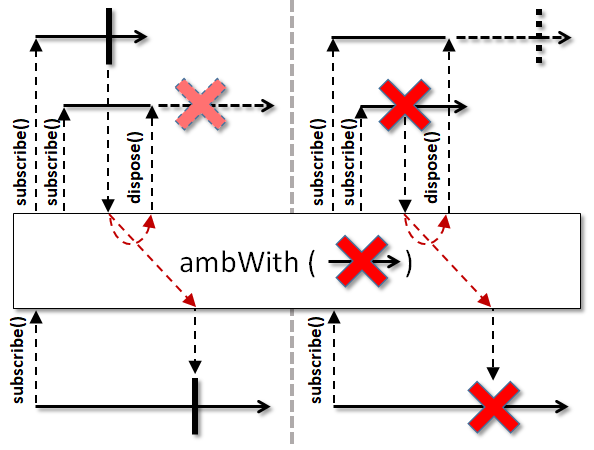 *
*
* - Scheduler:
* - {@code ambWith} does not operate by default on a particular {@link Scheduler}.
*
* @param other the other Completable, not null. A subscription to this provided source will occur after subscribing
* to the current source.
* @return the new Completable instance
* @throws NullPointerException if other is null
*/
@CheckReturnValue
@NonNull
@SchedulerSupport(SchedulerSupport.NONE)
public final Completable ambWith(CompletableSource other) {
ObjectHelper.requireNonNull(other, "other is null");
return ambArray(this, other);
}
/**
* Returns an Observable which will subscribe to this Completable and once that is completed then
* will subscribe to the {@code next} ObservableSource. An error event from this Completable will be
* propagated to the downstream subscriber and will result in skipping the subscription of the
* Observable.
*
* 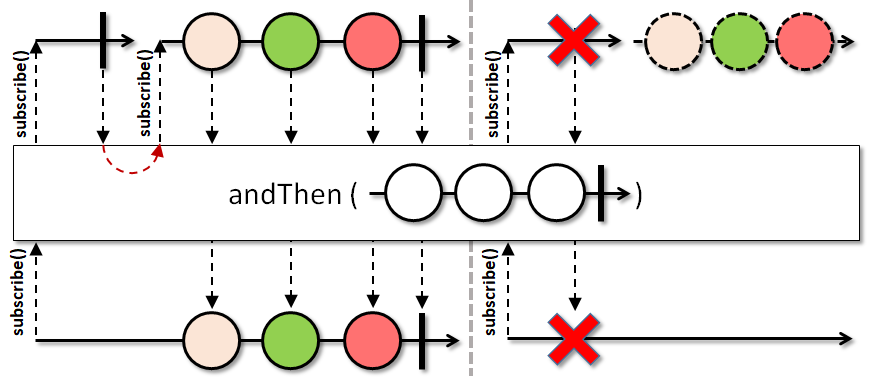 *
*
* - Scheduler:
* - {@code andThen} does not operate by default on a particular {@link Scheduler}.
*
* @param the value type of the next ObservableSource
* @param next the Observable to subscribe after this Completable is completed, not null
* @return Observable that composes this Completable and next
* @throws NullPointerException if next is null
*/
@CheckReturnValue
@NonNull
@SchedulerSupport(SchedulerSupport.NONE)
public final Observable andThen(ObservableSource next) {
ObjectHelper.requireNonNull(next, "next is null");
return RxJavaPlugins.onAssembly(new CompletableAndThenObservable(this, next));
}
/**
* Returns a Flowable which will subscribe to this Completable and once that is completed then
* will subscribe to the {@code next} Flowable. An error event from this Completable will be
* propagated to the downstream subscriber and will result in skipping the subscription of the
* Publisher.
*
* 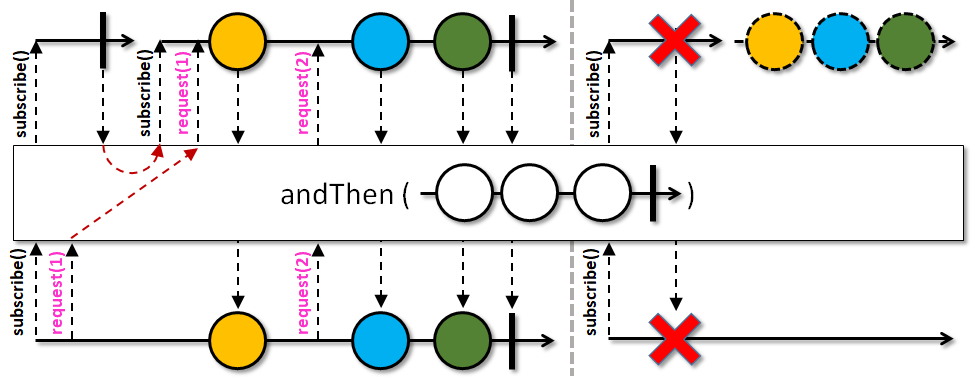 *
*
* - Backpressure:
* - The returned {@code Flowable} honors the backpressure of the downstream consumer
* and expects the other {@code Publisher} to honor it as well.
* - Scheduler:
* - {@code andThen} does not operate by default on a particular {@link Scheduler}.
*
* @param the value type of the next Publisher
* @param next the Publisher to subscribe after this Completable is completed, not null
* @return Flowable that composes this Completable and next
* @throws NullPointerException if next is null
*/
@CheckReturnValue
@NonNull
@BackpressureSupport(BackpressureKind.FULL)
@SchedulerSupport(SchedulerSupport.NONE)
public final Flowable andThen(Publisher next) {
ObjectHelper.requireNonNull(next, "next is null");
return RxJavaPlugins.onAssembly(new CompletableAndThenPublisher(this, next));
}
/**
* Returns a Single which will subscribe to this Completable and once that is completed then
* will subscribe to the {@code next} SingleSource. An error event from this Completable will be
* propagated to the downstream subscriber and will result in skipping the subscription of the
* Single.
*
* 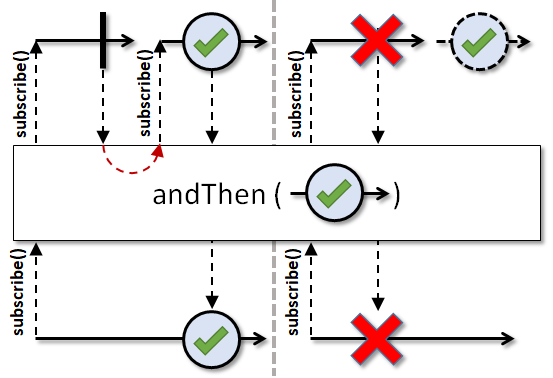 *
*
* - Scheduler:
* - {@code andThen} does not operate by default on a particular {@link Scheduler}.
*
*
* @param the value type of the next SingleSource
* @param next the Single to subscribe after this Completable is completed, not null
* @return Single that composes this Completable and next
*/
@CheckReturnValue
@NonNull
@SchedulerSupport(SchedulerSupport.NONE)
public final Single andThen(SingleSource next) {
ObjectHelper.requireNonNull(next, "next is null");
return RxJavaPlugins.onAssembly(new SingleDelayWithCompletable(next, this));
}
/**
* Returns a {@link Maybe} which will subscribe to this Completable and once that is completed then
* will subscribe to the {@code next} MaybeSource. An error event from this Completable will be
* propagated to the downstream subscriber and will result in skipping the subscription of the
* Maybe.
*
* 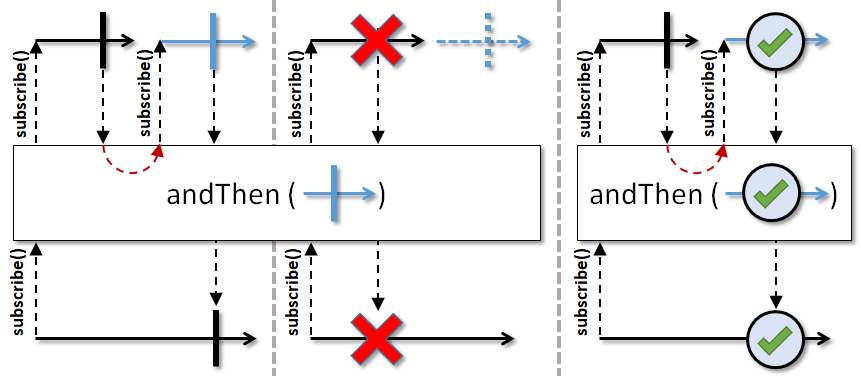 *
*
* - Scheduler:
* - {@code andThen} does not operate by default on a particular {@link Scheduler}.
*
*
* @param the value type of the next MaybeSource
* @param next the Maybe to subscribe after this Completable is completed, not null
* @return Maybe that composes this Completable and next
*/
@CheckReturnValue
@NonNull
@SchedulerSupport(SchedulerSupport.NONE)
public final Maybe andThen(MaybeSource next) {
ObjectHelper.requireNonNull(next, "next is null");
return RxJavaPlugins.onAssembly(new MaybeDelayWithCompletable(next, this));
}
/**
* Returns a Completable that first runs this Completable
* and then the other completable.
*
* 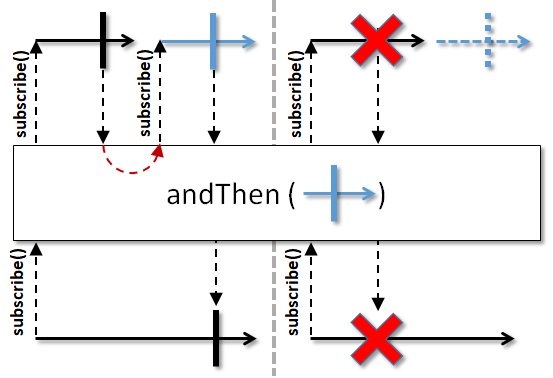 *
*
* This is an alias for {@link #concatWith(CompletableSource)}.
*
* - Scheduler:
* - {@code andThen} does not operate by default on a particular {@link Scheduler}.
*
* @param next the other Completable, not null
* @return the new Completable instance
* @throws NullPointerException if other is null
*/
@CheckReturnValue
@SchedulerSupport(SchedulerSupport.NONE)
public final Completable andThen(CompletableSource next) {
ObjectHelper.requireNonNull(next, "next is null");
return RxJavaPlugins.onAssembly(new CompletableAndThenCompletable(this, next));
}
/**
* Calls the specified converter function during assembly time and returns its resulting value.
*
* 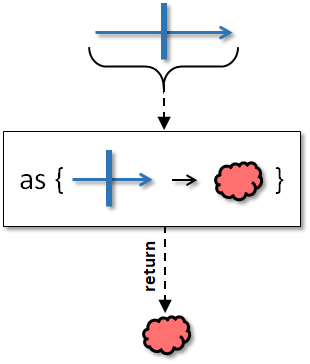 *
*
* This allows fluent conversion to any other type.
*
* - Scheduler:
* - {@code as} does not operate by default on a particular {@link Scheduler}.
*
* History: 2.1.7 - experimental
* @param the resulting object type
* @param converter the function that receives the current Completable instance and returns a value
* @return the converted value
* @throws NullPointerException if converter is null
* @since 2.2
*/
@CheckReturnValue
@SchedulerSupport(SchedulerSupport.NONE)
public final R as(@NonNull CompletableConverter converter) {
return ObjectHelper.requireNonNull(converter, "converter is null").apply(this);
}
/**
* Subscribes to and awaits the termination of this Completable instance in a blocking manner and
* rethrows any exception emitted.
*
* 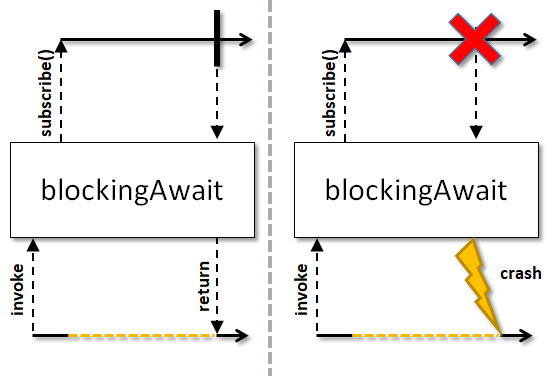 *
*
* - Scheduler:
* - {@code blockingAwait} does not operate by default on a particular {@link Scheduler}.
* - Error handling:
* - If the source signals an error, the operator wraps a checked {@link Exception}
* into {@link RuntimeException} and throws that. Otherwise, {@code RuntimeException}s and
* {@link Error}s are rethrown as they are.
*
* @throws RuntimeException wrapping an InterruptedException if the current thread is interrupted
*/
@SchedulerSupport(SchedulerSupport.NONE)
public final void blockingAwait() {
BlockingMultiObserver observer = new BlockingMultiObserver();
subscribe(observer);
observer.blockingGet();
}
/**
* Subscribes to and awaits the termination of this Completable instance in a blocking manner
* with a specific timeout and rethrows any exception emitted within the timeout window.
*
* 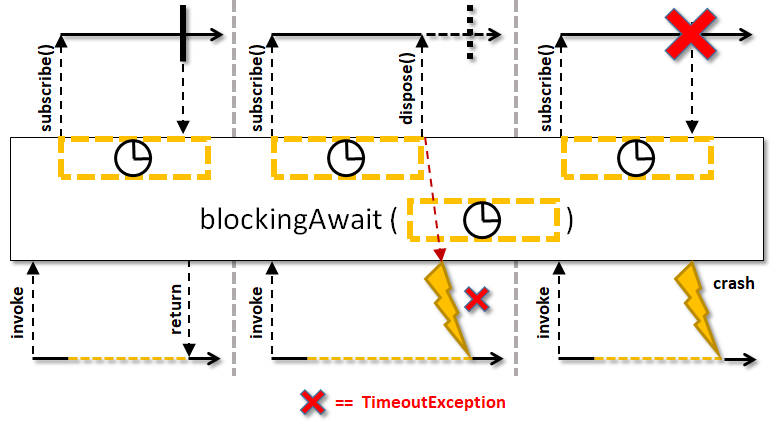 *
*
* - Scheduler:
* - {@code blockingAwait} does not operate by default on a particular {@link Scheduler}.
* - Error handling:
* - If the source signals an error, the operator wraps a checked {@link Exception}
* into {@link RuntimeException} and throws that. Otherwise, {@code RuntimeException}s and
* {@link Error}s are rethrown as they are.
*
* @param timeout the timeout value
* @param unit the timeout unit
* @return true if the this Completable instance completed normally within the time limit,
* false if the timeout elapsed before this Completable terminated.
* @throws RuntimeException wrapping an InterruptedException if the current thread is interrupted
*/
@CheckReturnValue
@NonNull
@SchedulerSupport(SchedulerSupport.NONE)
public final boolean blockingAwait(long timeout, TimeUnit unit) {
ObjectHelper.requireNonNull(unit, "unit is null");
BlockingMultiObserver observer = new BlockingMultiObserver();
subscribe(observer);
return observer.blockingAwait(timeout, unit);
}
/**
* Subscribes to this Completable instance and blocks until it terminates, then returns null or
* the emitted exception if any.
*
* 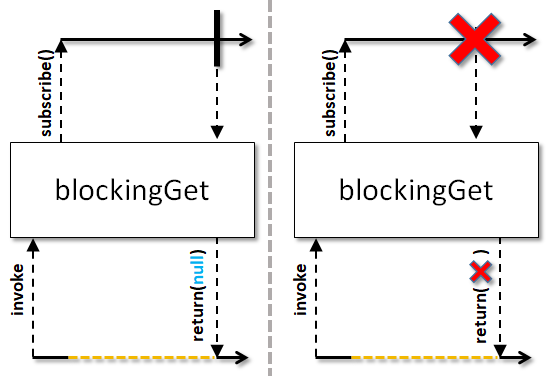 *
*
* - Scheduler:
* - {@code blockingGet} does not operate by default on a particular {@link Scheduler}.
*
* @return the throwable if this terminated with an error, null otherwise
* @throws RuntimeException that wraps an InterruptedException if the wait is interrupted
*/
@Nullable
@CheckReturnValue
@SchedulerSupport(SchedulerSupport.NONE)
public final Throwable blockingGet() {
BlockingMultiObserver observer = new BlockingMultiObserver();
subscribe(observer);
return observer.blockingGetError();
}
/**
* Subscribes to this Completable instance and blocks until it terminates or the specified timeout
* elapses, then returns null for normal termination or the emitted exception if any.
*
* 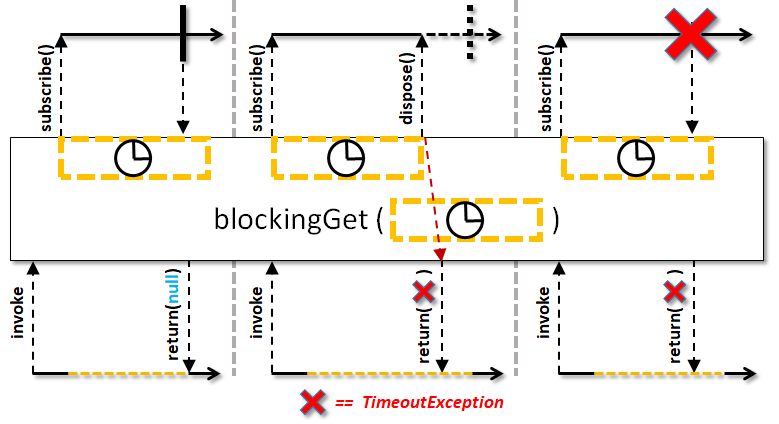 *
*
* - Scheduler:
* - {@code blockingGet} does not operate by default on a particular {@link Scheduler}.
*
* @param timeout the timeout value
* @param unit the time unit
* @return the throwable if this terminated with an error, null otherwise
* @throws RuntimeException that wraps an InterruptedException if the wait is interrupted or
* TimeoutException if the specified timeout elapsed before it
*/
@Nullable
@CheckReturnValue
@SchedulerSupport(SchedulerSupport.NONE)
public final Throwable blockingGet(long timeout, TimeUnit unit) {
ObjectHelper.requireNonNull(unit, "unit is null");
BlockingMultiObserver observer = new BlockingMultiObserver();
subscribe(observer);
return observer.blockingGetError(timeout, unit);
}
/**
* Subscribes to this Completable only once, when the first CompletableObserver
* subscribes to the result Completable, caches its terminal event
* and relays/replays it to observers.
*
* 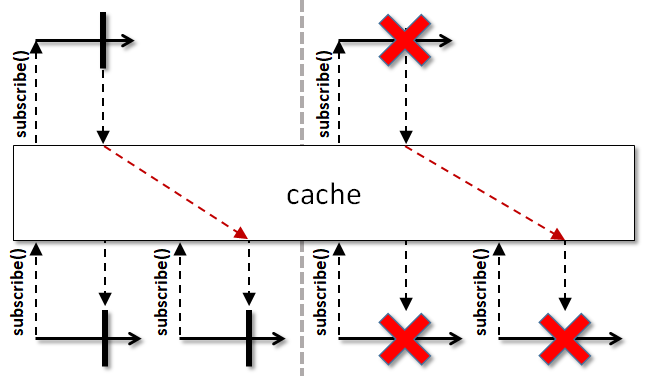 *
*
* Note that this operator doesn't allow disposing the connection
* of the upstream source.
*
* - Scheduler:
* - {@code cache} does not operate by default on a particular {@link Scheduler}.
*
* History: 2.0.4 - experimental
* @return the new Completable instance
* @since 2.1
*/
@CheckReturnValue
@SchedulerSupport(SchedulerSupport.NONE)
public final Completable cache() {
return RxJavaPlugins.onAssembly(new CompletableCache(this));
}
/**
* Calls the given transformer function with this instance and returns the function's resulting
* Completable.
*
* 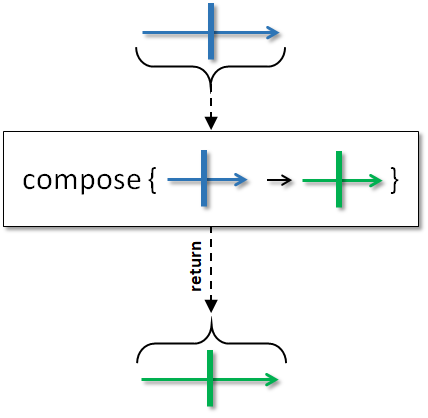 *
*
* - Scheduler:
* - {@code compose} does not operate by default on a particular {@link Scheduler}.
*
* @param transformer the transformer function, not null
* @return the Completable returned by the function
* @throws NullPointerException if transformer is null
*/
@CheckReturnValue
@SchedulerSupport(SchedulerSupport.NONE)
public final Completable compose(CompletableTransformer transformer) {
return wrap(ObjectHelper.requireNonNull(transformer, "transformer is null").apply(this));
}
/**
* Concatenates this Completable with another Completable.
*
* 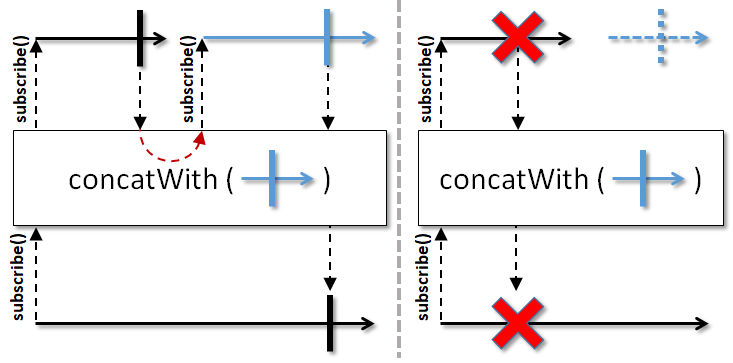 *
*
* - Scheduler:
* - {@code concatWith} does not operate by default on a particular {@link Scheduler}.
*
* @param other the other Completable, not null
* @return the new Completable which subscribes to this and then the other Completable
* @throws NullPointerException if other is null
* @see #andThen(MaybeSource)
* @see #andThen(ObservableSource)
* @see #andThen(SingleSource)
* @see #andThen(Publisher)
*/
@CheckReturnValue
@NonNull
@SchedulerSupport(SchedulerSupport.NONE)
public final Completable concatWith(CompletableSource other) {
ObjectHelper.requireNonNull(other, "other is null");
return RxJavaPlugins.onAssembly(new CompletableAndThenCompletable(this, other));
}
/**
* Returns a Completable which delays the emission of the completion event by the given time.
*
* 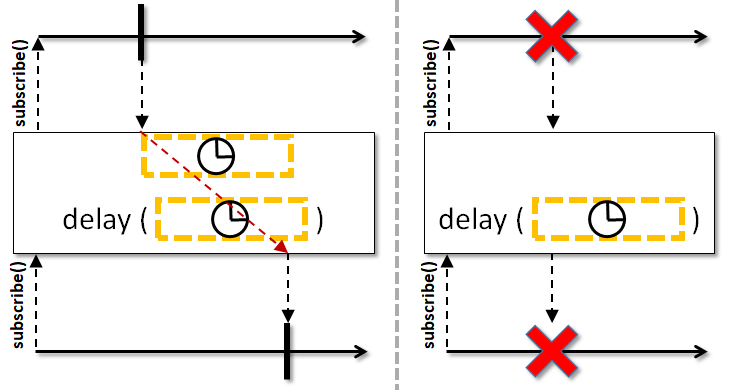 *
*
* - Scheduler:
* - {@code delay} does operate by default on the {@code computation} {@link Scheduler}.
*
* @param delay the delay time
* @param unit the delay unit
* @return the new Completable instance
* @throws NullPointerException if unit is null
*/
@CheckReturnValue
@SchedulerSupport(SchedulerSupport.COMPUTATION)
public final Completable delay(long delay, TimeUnit unit) {
return delay(delay, unit, Schedulers.computation(), false);
}
/**
* Returns a Completable which delays the emission of the completion event by the given time while
* running on the specified scheduler.
*
* 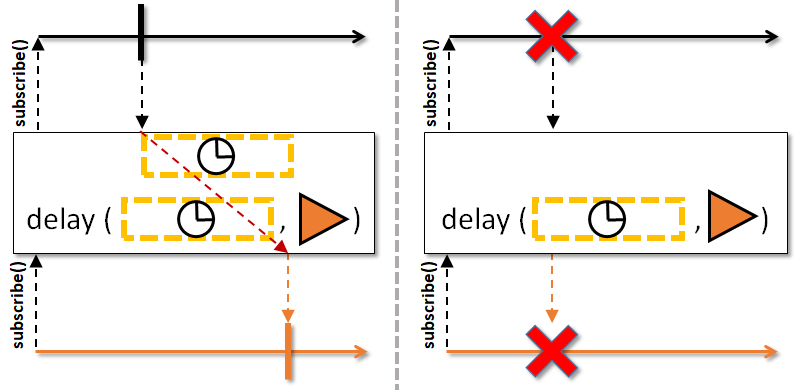 *
*
* - Scheduler:
* - {@code delay} operates on the {@link Scheduler} you specify.
*
* @param delay the delay time
* @param unit the delay unit
* @param scheduler the scheduler to run the delayed completion on
* @return the new Completable instance
* @throws NullPointerException if unit or scheduler is null
*/
@CheckReturnValue
@SchedulerSupport(SchedulerSupport.CUSTOM)
public final Completable delay(long delay, TimeUnit unit, Scheduler scheduler) {
return delay(delay, unit, scheduler, false);
}
/**
* Returns a Completable which delays the emission of the completion event, and optionally the error as well, by the given time while
* running on the specified scheduler.
*
* 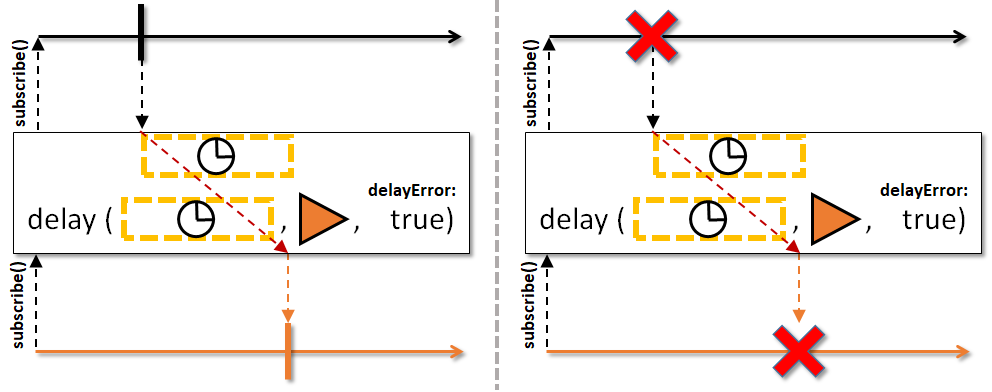 *
*
* - Scheduler:
* - {@code delay} operates on the {@link Scheduler} you specify.
*
* @param delay the delay time
* @param unit the delay unit
* @param scheduler the scheduler to run the delayed completion on
* @param delayError delay the error emission as well?
* @return the new Completable instance
* @throws NullPointerException if unit or scheduler is null
*/
@CheckReturnValue
@NonNull
@SchedulerSupport(SchedulerSupport.CUSTOM)
public final Completable delay(final long delay, final TimeUnit unit, final Scheduler scheduler, final boolean delayError) {
ObjectHelper.requireNonNull(unit, "unit is null");
ObjectHelper.requireNonNull(scheduler, "scheduler is null");
return RxJavaPlugins.onAssembly(new CompletableDelay(this, delay, unit, scheduler, delayError));
}
/**
* Returns a Completable that delays the subscription to the source CompletableSource by a given amount of time.
*
* 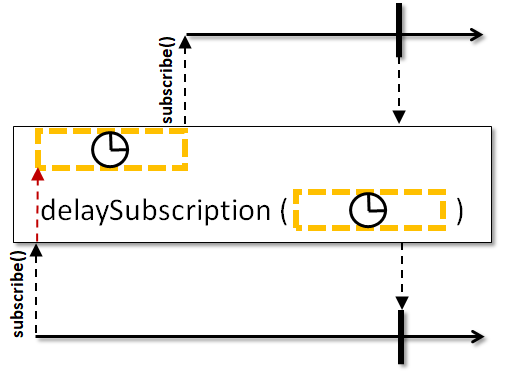 *
*
* - Scheduler:
* - This version of {@code delaySubscription} operates by default on the {@code computation} {@link Scheduler}.
*
*
* @param delay the time to delay the subscription
* @param unit the time unit of {@code delay}
* @return a Completable that delays the subscription to the source CompletableSource by the given amount
* @since 2.2.3 - experimental
* @see ReactiveX operators documentation: Delay
*/
@CheckReturnValue
@Experimental
@SchedulerSupport(SchedulerSupport.COMPUTATION)
public final Completable delaySubscription(long delay, TimeUnit unit) {
return delaySubscription(delay, unit, Schedulers.computation());
}
/**
* Returns a Completable that delays the subscription to the source CompletableSource by a given amount of time,
* both waiting and subscribing on a given Scheduler.
*
* 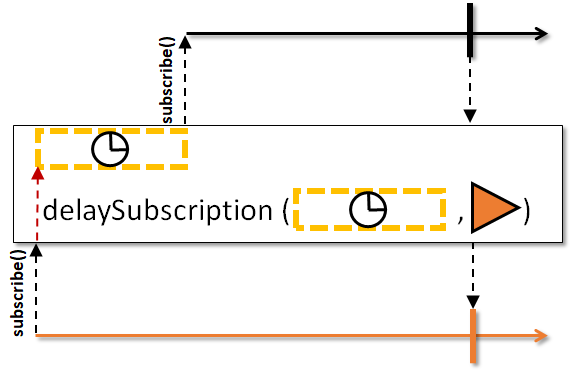 *
*
* - Scheduler:
* - You specify which {@link Scheduler} this operator will use.
*
*
* @param delay the time to delay the subscription
* @param unit the time unit of {@code delay}
* @param scheduler the Scheduler on which the waiting and subscription will happen
* @return a Completable that delays the subscription to the source CompletableSource by a given
* amount, waiting and subscribing on the given Scheduler
* @since 2.2.3 - experimental
* @see ReactiveX operators documentation: Delay
*/
@CheckReturnValue
@Experimental
@SchedulerSupport(SchedulerSupport.CUSTOM)
public final Completable delaySubscription(long delay, TimeUnit unit, Scheduler scheduler) {
return Completable.timer(delay, unit, scheduler).andThen(this);
}
/**
* Returns a Completable which calls the given onComplete callback if this Completable completes.
*
* 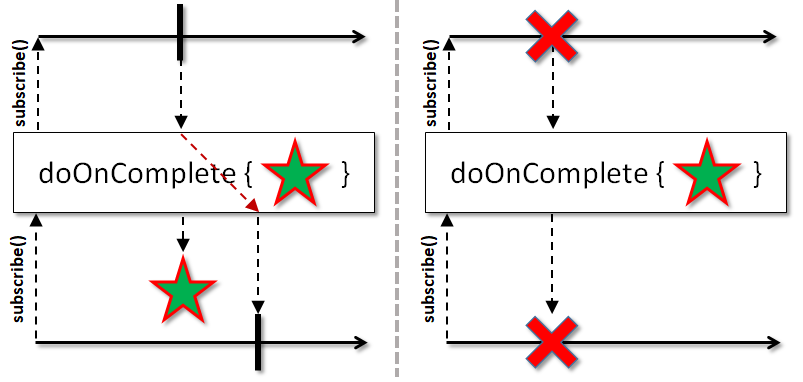 *
*
* - Scheduler:
* - {@code doOnComplete} does not operate by default on a particular {@link Scheduler}.
*
* @param onComplete the callback to call when this emits an onComplete event
* @return the new Completable instance
* @throws NullPointerException if onComplete is null
* @see #doFinally(Action)
*/
@CheckReturnValue
@SchedulerSupport(SchedulerSupport.NONE)
public final Completable doOnComplete(Action onComplete) {
return doOnLifecycle(Functions.emptyConsumer(), Functions.emptyConsumer(),
onComplete, Functions.EMPTY_ACTION,
Functions.EMPTY_ACTION, Functions.EMPTY_ACTION);
}
/**
* Calls the shared {@code Action} if a CompletableObserver subscribed to the current
* Completable disposes the common Disposable it received via onSubscribe.
*
* 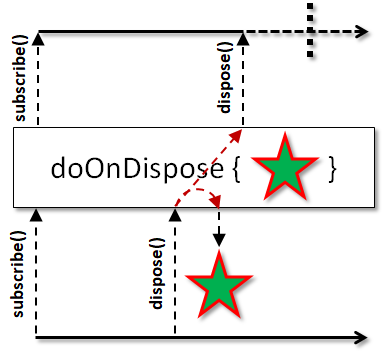 *
*
* - Scheduler:
* - {@code doOnDispose} does not operate by default on a particular {@link Scheduler}.
*
* @param onDispose the action to call when the child subscriber disposes the subscription
* @return the new Completable instance
* @throws NullPointerException if onDispose is null
*/
@CheckReturnValue
@SchedulerSupport(SchedulerSupport.NONE)
public final Completable doOnDispose(Action onDispose) {
return doOnLifecycle(Functions.emptyConsumer(), Functions.emptyConsumer(),
Functions.EMPTY_ACTION, Functions.EMPTY_ACTION,
Functions.EMPTY_ACTION, onDispose);
}
/**
* Returns a Completable which calls the given onError callback if this Completable emits an error.
*
* 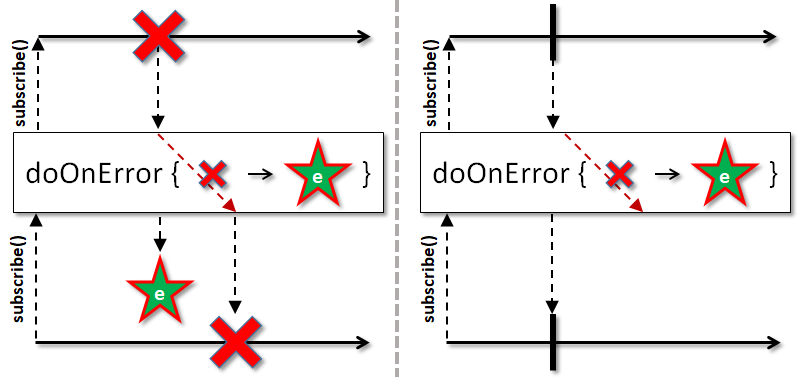 *
*
* - Scheduler:
* - {@code doOnError} does not operate by default on a particular {@link Scheduler}.
*
* @param onError the error callback
* @return the new Completable instance
* @throws NullPointerException if onError is null
* @see #doFinally(Action)
*/
@CheckReturnValue
@SchedulerSupport(SchedulerSupport.NONE)
public final Completable doOnError(Consumer onError) {
return doOnLifecycle(Functions.emptyConsumer(), onError,
Functions.EMPTY_ACTION, Functions.EMPTY_ACTION,
Functions.EMPTY_ACTION, Functions.EMPTY_ACTION);
}
/**
* Returns a Completable which calls the given onEvent callback with the (throwable) for an onError
* or (null) for an onComplete signal from this Completable before delivering said signal to the downstream.
*
* 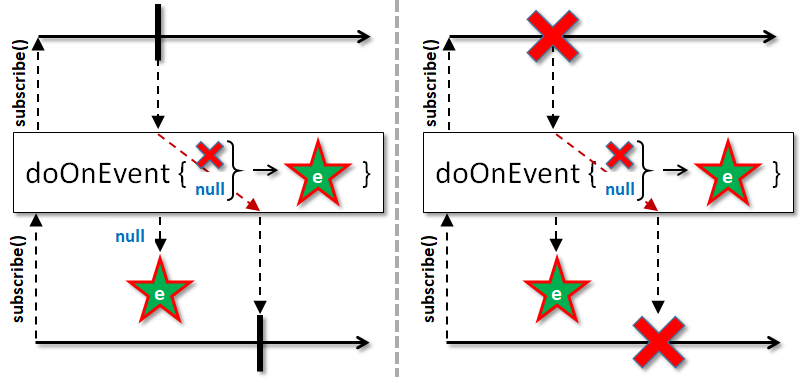 *
*
* - Scheduler:
* - {@code doOnEvent} does not operate by default on a particular {@link Scheduler}.
*
* @param onEvent the event callback
* @return the new Completable instance
* @throws NullPointerException if onEvent is null
*/
@CheckReturnValue
@NonNull
@SchedulerSupport(SchedulerSupport.NONE)
public final Completable doOnEvent(final Consumer onEvent) {
ObjectHelper.requireNonNull(onEvent, "onEvent is null");
return RxJavaPlugins.onAssembly(new CompletableDoOnEvent(this, onEvent));
}
/**
* Returns a Completable instance that calls the various callbacks on the specific
* lifecycle events.
*
* - Scheduler:
* - {@code doOnLifecycle} does not operate by default on a particular {@link Scheduler}.
*
* @param onSubscribe the consumer called when a CompletableSubscriber subscribes.
* @param onError the consumer called when this emits an onError event
* @param onComplete the runnable called just before when this Completable completes normally
* @param onAfterTerminate the runnable called after this Completable completes normally
* @param onDispose the runnable called when the child disposes the subscription
* @return the new Completable instance
*/
@CheckReturnValue
@NonNull
@SchedulerSupport(SchedulerSupport.NONE)
private Completable doOnLifecycle(
final Consumer onSubscribe,
final Consumer onError,
final Action onComplete,
final Action onTerminate,
final Action onAfterTerminate,
final Action onDispose) {
ObjectHelper.requireNonNull(onSubscribe, "onSubscribe is null");
ObjectHelper.requireNonNull(onError, "onError is null");
ObjectHelper.requireNonNull(onComplete, "onComplete is null");
ObjectHelper.requireNonNull(onTerminate, "onTerminate is null");
ObjectHelper.requireNonNull(onAfterTerminate, "onAfterTerminate is null");
ObjectHelper.requireNonNull(onDispose, "onDispose is null");
return RxJavaPlugins.onAssembly(new CompletablePeek(this, onSubscribe, onError, onComplete, onTerminate, onAfterTerminate, onDispose));
}
/**
* Returns a Completable instance that calls the given onSubscribe callback with the disposable
* that child subscribers receive on subscription.
*
* 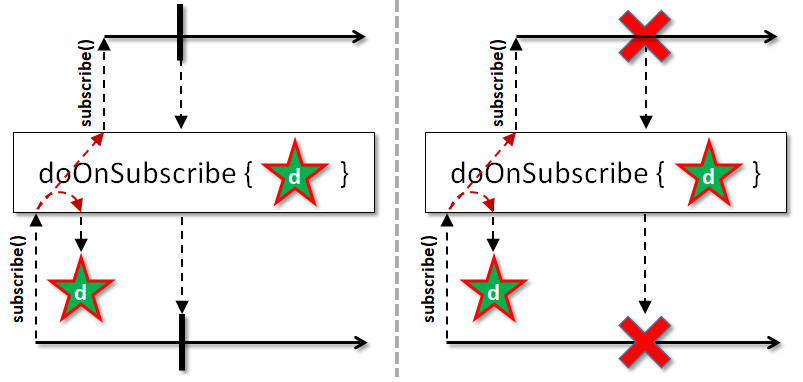 *
*
* - Scheduler:
* - {@code doOnSubscribe} does not operate by default on a particular {@link Scheduler}.
*
* @param onSubscribe the callback called when a child subscriber subscribes
* @return the new Completable instance
* @throws NullPointerException if onSubscribe is null
*/
@CheckReturnValue
@SchedulerSupport(SchedulerSupport.NONE)
public final Completable doOnSubscribe(Consumer onSubscribe) {
return doOnLifecycle(onSubscribe, Functions.emptyConsumer(),
Functions.EMPTY_ACTION, Functions.EMPTY_ACTION,
Functions.EMPTY_ACTION, Functions.EMPTY_ACTION);
}
/**
* Returns a Completable instance that calls the given onTerminate callback just before this Completable
* completes normally or with an exception.
*
* 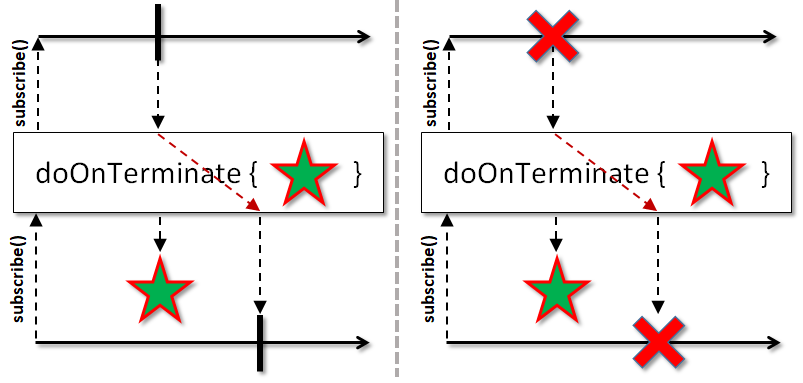 *
*
* - Scheduler:
* - {@code doOnTerminate} does not operate by default on a particular {@link Scheduler}.
*
* @param onTerminate the callback to call just before this Completable terminates
* @return the new Completable instance
* @see #doFinally(Action)
*/
@CheckReturnValue
@SchedulerSupport(SchedulerSupport.NONE)
public final Completable doOnTerminate(final Action onTerminate) {
return doOnLifecycle(Functions.emptyConsumer(), Functions.emptyConsumer(),
Functions.EMPTY_ACTION, onTerminate,
Functions.EMPTY_ACTION, Functions.EMPTY_ACTION);
}
/**
* Returns a Completable instance that calls the given onTerminate callback after this Completable
* completes normally or with an exception.
*
* 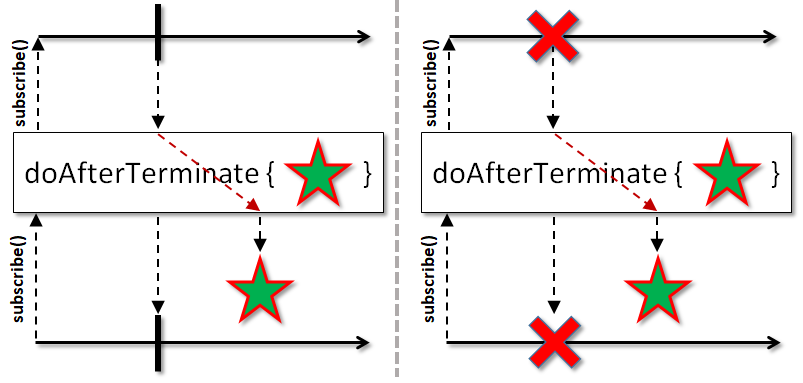 *
*
* - Scheduler:
* - {@code doAfterTerminate} does not operate by default on a particular {@link Scheduler}.
*
* @param onAfterTerminate the callback to call after this Completable terminates
* @return the new Completable instance
* @see #doFinally(Action)
*/
@CheckReturnValue
@SchedulerSupport(SchedulerSupport.NONE)
public final Completable doAfterTerminate(final Action onAfterTerminate) {
return doOnLifecycle(
Functions.emptyConsumer(),
Functions.emptyConsumer(),
Functions.EMPTY_ACTION,
Functions.EMPTY_ACTION,
onAfterTerminate,
Functions.EMPTY_ACTION);
}
/**
* Calls the specified action after this Completable signals onError or onComplete or gets disposed by
* the downstream.
*
* 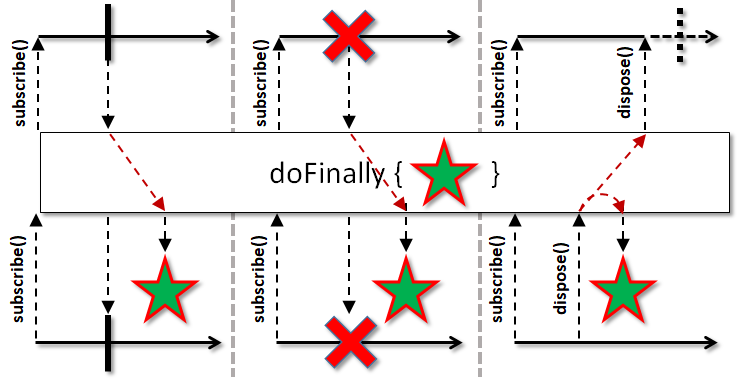 *
*
* In case of a race between a terminal event and a dispose call, the provided {@code onFinally} action
* is executed once per subscription.
*
* Note that the {@code onFinally} action is shared between subscriptions and as such
* should be thread-safe.
*
* - Scheduler:
* - {@code doFinally} does not operate by default on a particular {@link Scheduler}.
*
* History: 2.0.1 - experimental
* @param onFinally the action called when this Completable terminates or gets disposed
* @return the new Completable instance
* @since 2.1
*/
@CheckReturnValue
@NonNull
@SchedulerSupport(SchedulerSupport.NONE)
public final Completable doFinally(Action onFinally) {
ObjectHelper.requireNonNull(onFinally, "onFinally is null");
return RxJavaPlugins.onAssembly(new CompletableDoFinally(this, onFinally));
}
/**
* This method requires advanced knowledge about building operators, please consider
* other standard composition methods first;
* Returns a {@code Completable} which, when subscribed to, invokes the {@link CompletableOperator#apply(CompletableObserver) apply(CompletableObserver)} method
* of the provided {@link CompletableOperator} for each individual downstream {@link Completable} and allows the
* insertion of a custom operator by accessing the downstream's {@link CompletableObserver} during this subscription phase
* and providing a new {@code CompletableObserver}, containing the custom operator's intended business logic, that will be
* used in the subscription process going further upstream.
*
* 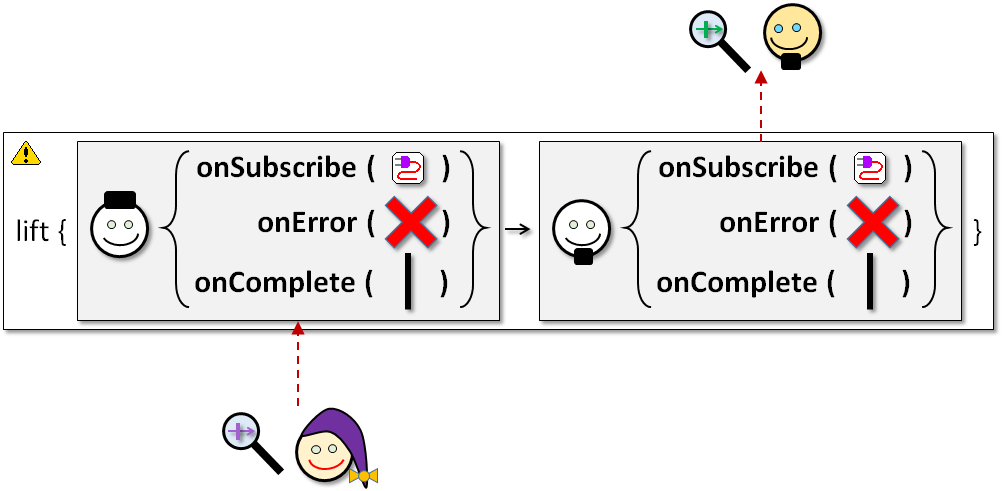 *
*
* Generally, such a new {@code CompletableObserver} will wrap the downstream's {@code CompletableObserver} and forwards the
* {@code onError} and {@code onComplete} events from the upstream directly or according to the
* emission pattern the custom operator's business logic requires. In addition, such operator can intercept the
* flow control calls of {@code dispose} and {@code isDisposed} that would have traveled upstream and perform
* additional actions depending on the same business logic requirements.
*
* Example:
*
* // Step 1: Create the consumer type that will be returned by the CompletableOperator.apply():
*
* public final class CustomCompletableObserver implements CompletableObserver, Disposable {
*
* // The downstream's CompletableObserver that will receive the onXXX events
* final CompletableObserver downstream;
*
* // The connection to the upstream source that will call this class' onXXX methods
* Disposable upstream;
*
* // The constructor takes the downstream subscriber and usually any other parameters
* public CustomCompletableObserver(CompletableObserver downstream) {
* this.downstream = downstream;
* }
*
* // In the subscription phase, the upstream sends a Disposable to this class
* // and subsequently this class has to send a Disposable to the downstream.
* // Note that relaying the upstream's Disposable directly is not allowed in RxJava
* @Override
* public void onSubscribe(Disposable d) {
* if (upstream != null) {
* d.dispose();
* } else {
* upstream = d;
* downstream.onSubscribe(this);
* }
* }
*
* // Some operators may handle the upstream's error while others
* // could just forward it to the downstream.
* @Override
* public void onError(Throwable throwable) {
* downstream.onError(throwable);
* }
*
* // When the upstream completes, usually the downstream should complete as well.
* // In completable, this could also mean doing some side-effects
* @Override
* public void onComplete() {
* System.out.println("Sequence completed");
* downstream.onComplete();
* }
*
* // Some operators may use their own resources which should be cleaned up if
* // the downstream disposes the flow before it completed. Operators without
* // resources can simply forward the dispose to the upstream.
* // In some cases, a disposed flag may be set by this method so that other parts
* // of this class may detect the dispose and stop sending events
* // to the downstream.
* @Override
* public void dispose() {
* upstream.dispose();
* }
*
* // Some operators may simply forward the call to the upstream while others
* // can return the disposed flag set in dispose().
* @Override
* public boolean isDisposed() {
* return upstream.isDisposed();
* }
* }
*
* // Step 2: Create a class that implements the CompletableOperator interface and
* // returns the custom consumer type from above in its apply() method.
* // Such class may define additional parameters to be submitted to
* // the custom consumer type.
*
* final class CustomCompletableOperator implements CompletableOperator {
* @Override
* public CompletableObserver apply(CompletableObserver upstream) {
* return new CustomCompletableObserver(upstream);
* }
* }
*
* // Step 3: Apply the custom operator via lift() in a flow by creating an instance of it
* // or reusing an existing one.
*
* Completable.complete()
* .lift(new CustomCompletableOperator())
* .test()
* .assertResult();
*
*
* Creating custom operators can be complicated and it is recommended one consults the
* RxJava wiki: Writing operators page about
* the tools, requirements, rules, considerations and pitfalls of implementing them.
*
* Note that implementing custom operators via this {@code lift()} method adds slightly more overhead by requiring
* an additional allocation and indirection per assembled flows. Instead, extending the abstract {@code Completable}
* class and creating a {@link CompletableTransformer} with it is recommended.
*
* Note also that it is not possible to stop the subscription phase in {@code lift()} as the {@code apply()} method
* requires a non-null {@code CompletableObserver} instance to be returned, which is then unconditionally subscribed to
* the upstream {@code Completable}. For example, if the operator decided there is no reason to subscribe to the
* upstream source because of some optimization possibility or a failure to prepare the operator, it still has to
* return a {@code CompletableObserver} that should immediately dispose the upstream's {@code Disposable} in its
* {@code onSubscribe} method. Again, using a {@code CompletableTransformer} and extending the {@code Completable} is
* a better option as {@link #subscribeActual} can decide to not subscribe to its upstream after all.
*
* - Scheduler:
* - {@code lift} does not operate by default on a particular {@link Scheduler}, however, the
* {@link CompletableOperator} may use a {@code Scheduler} to support its own asynchronous behavior.
*
*
* @param onLift the {@link CompletableOperator} that receives the downstream's {@code CompletableObserver} and should return
* a {@code CompletableObserver} with custom behavior to be used as the consumer for the current
* {@code Completable}.
* @return the new Completable instance
* @see RxJava wiki: Writing operators
* @see #compose(CompletableTransformer)
*/
@CheckReturnValue
@NonNull
@SchedulerSupport(SchedulerSupport.NONE)
public final Completable lift(final CompletableOperator onLift) {
ObjectHelper.requireNonNull(onLift, "onLift is null");
return RxJavaPlugins.onAssembly(new CompletableLift(this, onLift));
}
/**
* Maps the signal types of this Completable into a {@link Notification} of the same kind
* and emits it as a single success value to downstream.
*
* 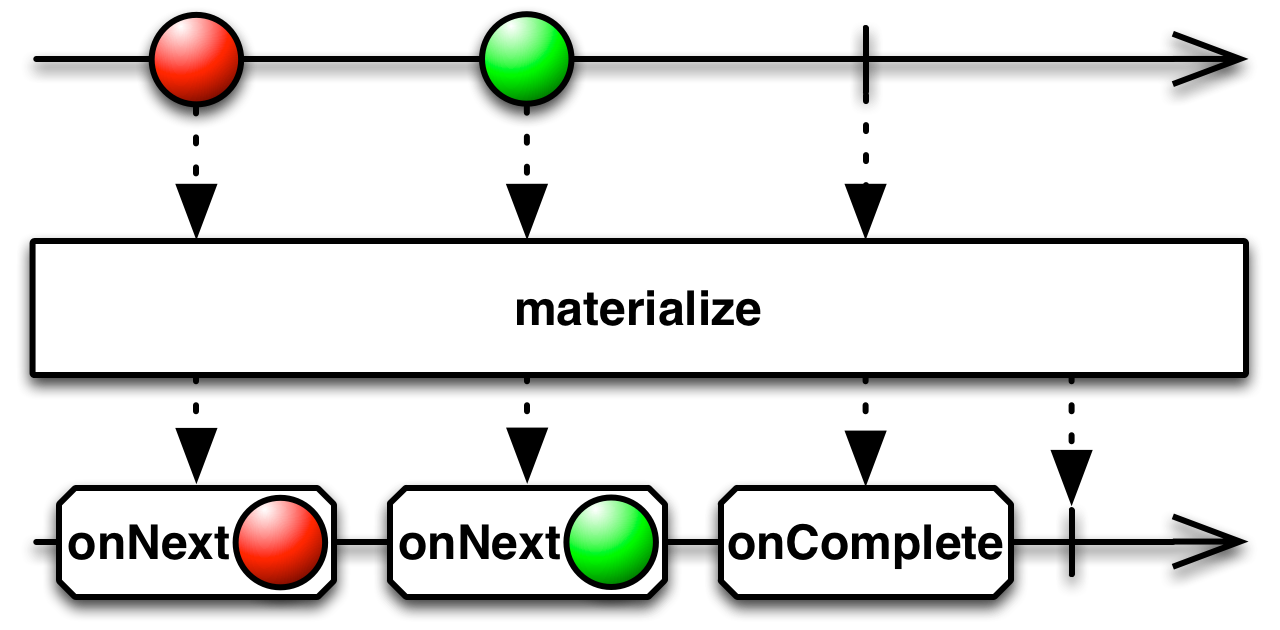 *
*
* - Scheduler:
* - {@code materialize} does not operate by default on a particular {@link Scheduler}.
*
* @param the intended target element type of the notification
* @return the new Single instance
* @since 2.2.4 - experimental
* @see Single#dematerialize(Function)
*/
@Experimental
@CheckReturnValue
@SchedulerSupport(SchedulerSupport.NONE)
public final Single> materialize() {
return RxJavaPlugins.onAssembly(new CompletableMaterialize(this));
}
/**
* Returns a Completable which subscribes to this and the other Completable and completes
* when both of them complete or one emits an error.
*
* 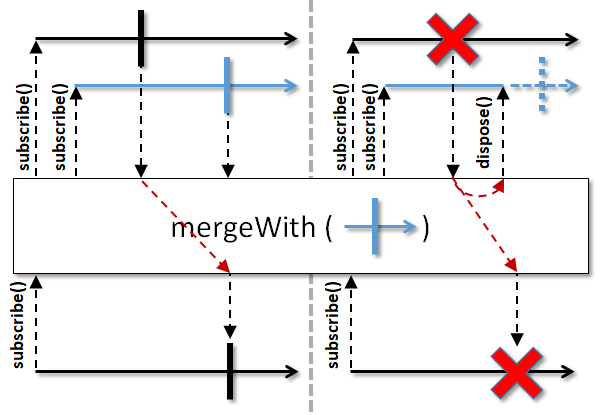 *
*
* - Scheduler:
* - {@code mergeWith} does not operate by default on a particular {@link Scheduler}.
*
* @param other the other Completable instance
* @return the new Completable instance
* @throws NullPointerException if other is null
*/
@CheckReturnValue
@NonNull
@SchedulerSupport(SchedulerSupport.NONE)
public final Completable mergeWith(CompletableSource other) {
ObjectHelper.requireNonNull(other, "other is null");
return mergeArray(this, other);
}
/**
* Returns a Completable which emits the terminal events from the thread of the specified scheduler.
*
* 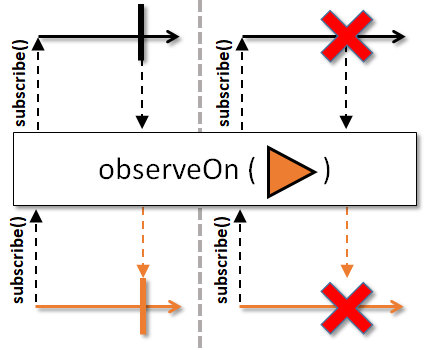 *
*
* - Scheduler:
* - {@code observeOn} operates on a {@link Scheduler} you specify.
*
* @param scheduler the scheduler to emit terminal events on
* @return the new Completable instance
* @throws NullPointerException if scheduler is null
*/
@CheckReturnValue
@NonNull
@SchedulerSupport(SchedulerSupport.CUSTOM)
public final Completable observeOn(final Scheduler scheduler) {
ObjectHelper.requireNonNull(scheduler, "scheduler is null");
return RxJavaPlugins.onAssembly(new CompletableObserveOn(this, scheduler));
}
/**
* Returns a Completable instance that if this Completable emits an error, it will emit an onComplete
* and swallow the throwable.
*
* 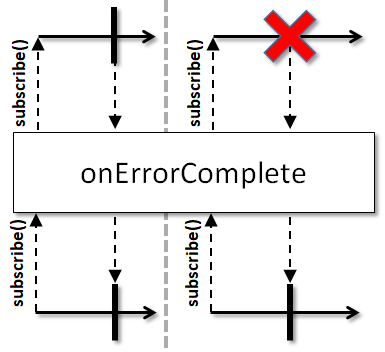 *
*
* - Scheduler:
* - {@code onErrorComplete} does not operate by default on a particular {@link Scheduler}.
*
* @return the new Completable instance
*/
@CheckReturnValue
@SchedulerSupport(SchedulerSupport.NONE)
public final Completable onErrorComplete() {
return onErrorComplete(Functions.alwaysTrue());
}
/**
* Returns a Completable instance that if this Completable emits an error and the predicate returns
* true, it will emit an onComplete and swallow the throwable.
*
* 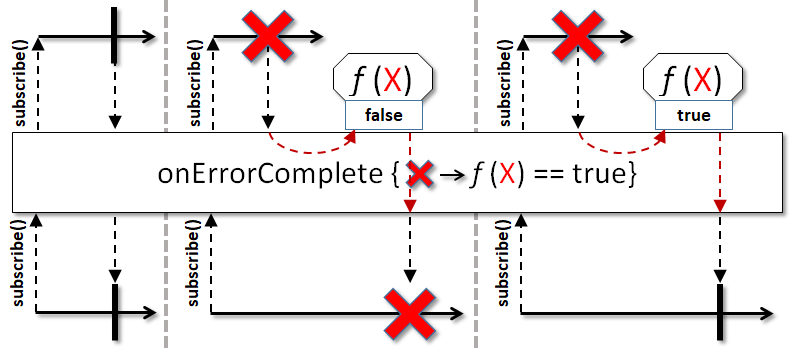 *
*
* - Scheduler:
* - {@code onErrorComplete} does not operate by default on a particular {@link Scheduler}.
*
* @param predicate the predicate to call when an Throwable is emitted which should return true
* if the Throwable should be swallowed and replaced with an onComplete.
* @return the new Completable instance
*/
@CheckReturnValue
@NonNull
@SchedulerSupport(SchedulerSupport.NONE)
public final Completable onErrorComplete(final Predicate predicate) {
ObjectHelper.requireNonNull(predicate, "predicate is null");
return RxJavaPlugins.onAssembly(new CompletableOnErrorComplete(this, predicate));
}
/**
* Returns a Completable instance that when encounters an error from this Completable, calls the
* specified mapper function that returns another Completable instance for it and resumes the
* execution with it.
*
* 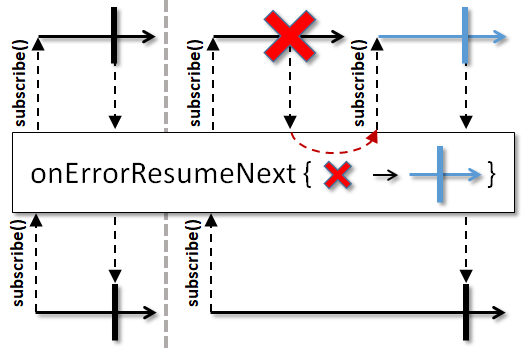 *
*
* - Scheduler:
* - {@code onErrorResumeNext} does not operate by default on a particular {@link Scheduler}.
*
* @param errorMapper the mapper function that takes the error and should return a Completable as
* continuation.
* @return the new Completable instance
*/
@CheckReturnValue
@NonNull
@SchedulerSupport(SchedulerSupport.NONE)
public final Completable onErrorResumeNext(final Function errorMapper) {
ObjectHelper.requireNonNull(errorMapper, "errorMapper is null");
return RxJavaPlugins.onAssembly(new CompletableResumeNext(this, errorMapper));
}
/**
* Nulls out references to the upstream producer and downstream CompletableObserver if
* the sequence is terminated or downstream calls dispose().
*
* 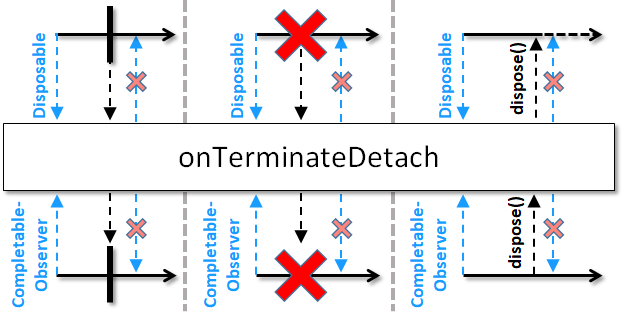 *
*
* - Scheduler:
* - {@code onTerminateDetach} does not operate by default on a particular {@link Scheduler}.
*
* History: 2.1.5 - experimental
* @return a Completable which nulls out references to the upstream producer and downstream CompletableObserver if
* the sequence is terminated or downstream calls dispose()
* @since 2.2
*/
@CheckReturnValue
@SchedulerSupport(SchedulerSupport.NONE)
public final Completable onTerminateDetach() {
return RxJavaPlugins.onAssembly(new CompletableDetach(this));
}
/**
* Returns a Completable that repeatedly subscribes to this Completable until disposed.
*
* 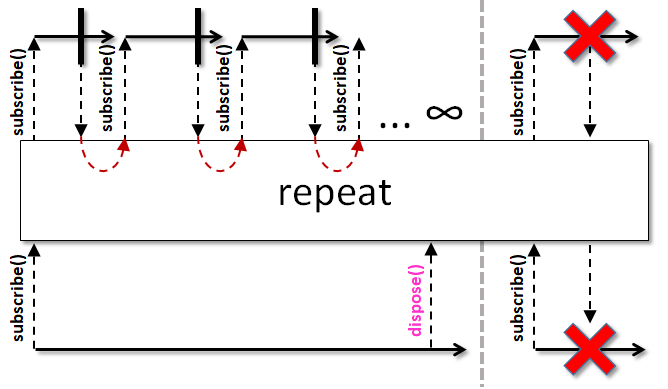 *
*
* - Scheduler:
* - {@code repeat} does not operate by default on a particular {@link Scheduler}.
*
* @return the new Completable instance
*/
@CheckReturnValue
@SchedulerSupport(SchedulerSupport.NONE)
public final Completable repeat() {
return fromPublisher(toFlowable().repeat());
}
/**
* Returns a Completable that subscribes repeatedly at most the given times to this Completable.
*
* 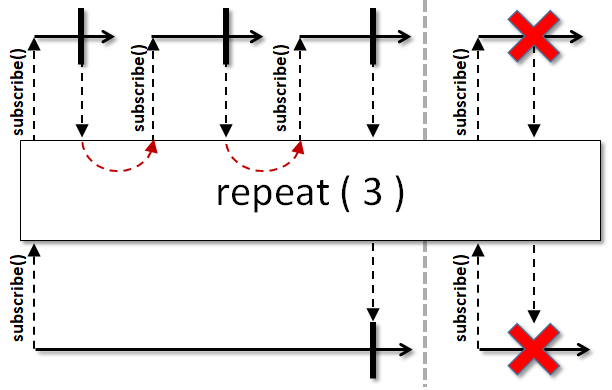 *
*
* - Scheduler:
* - {@code repeat} does not operate by default on a particular {@link Scheduler}.
*
* @param times the number of times the resubscription should happen
* @return the new Completable instance
* @throws IllegalArgumentException if times is less than zero
*/
@CheckReturnValue
@SchedulerSupport(SchedulerSupport.NONE)
public final Completable repeat(long times) {
return fromPublisher(toFlowable().repeat(times));
}
/**
* Returns a Completable that repeatedly subscribes to this Completable so long as the given
* stop supplier returns false.
*
* 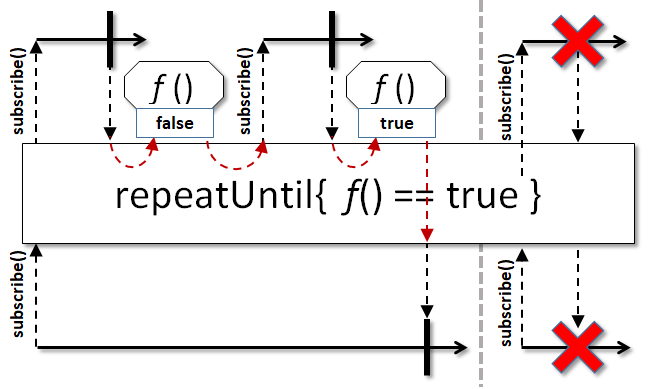 *
*
* - Scheduler:
* - {@code repeatUntil} does not operate by default on a particular {@link Scheduler}.
*
* @param stop the supplier that should return true to stop resubscribing.
* @return the new Completable instance
* @throws NullPointerException if stop is null
*/
@CheckReturnValue
@SchedulerSupport(SchedulerSupport.NONE)
public final Completable repeatUntil(BooleanSupplier stop) {
return fromPublisher(toFlowable().repeatUntil(stop));
}
/**
* Returns a Completable instance that repeats when the Publisher returned by the handler
* emits an item or completes when this Publisher emits a completed event.
*
* 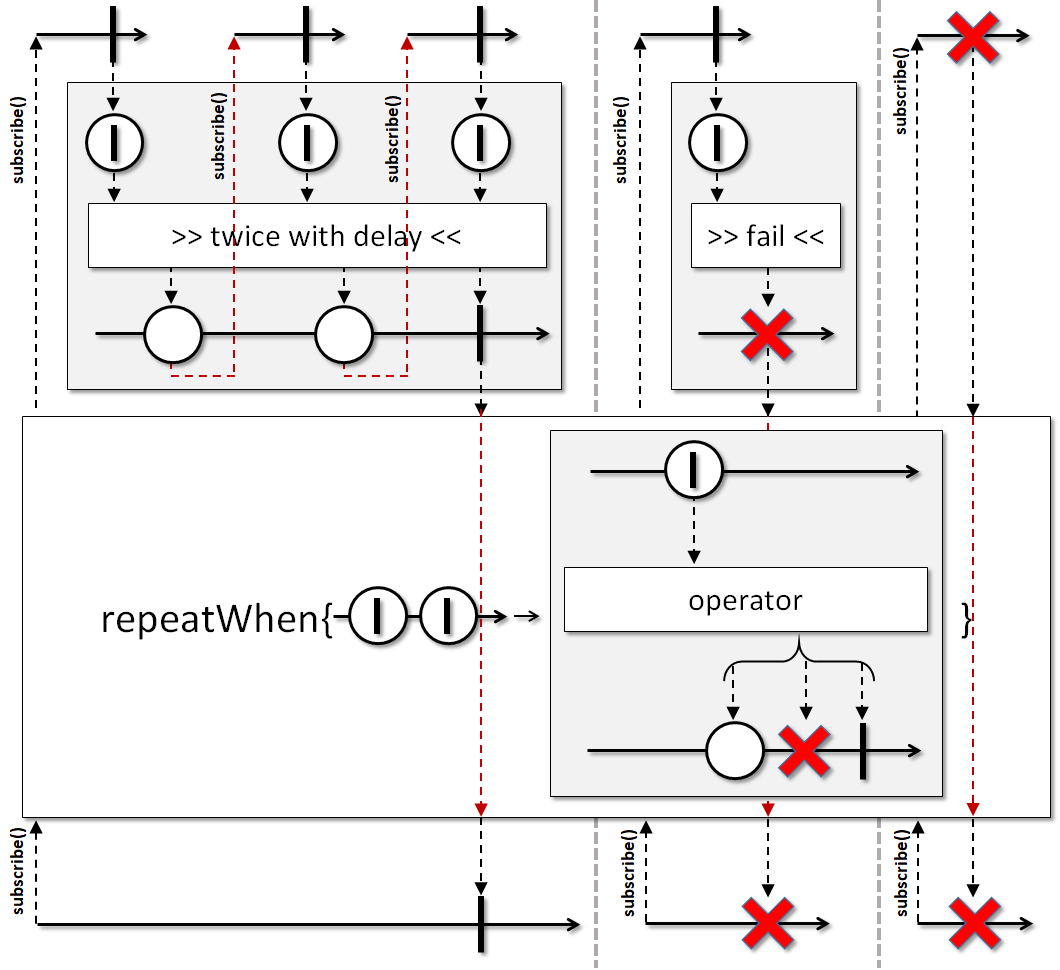 *
*
* - Scheduler:
* - {@code repeatWhen} does not operate by default on a particular {@link Scheduler}.
*
* @param handler the function that transforms the stream of values indicating the completion of
* this Completable and returns a Publisher that emits items for repeating or completes to indicate the
* repetition should stop
* @return the new Completable instance
* @throws NullPointerException if stop is null
*/
@CheckReturnValue
@SchedulerSupport(SchedulerSupport.NONE)
public final Completable repeatWhen(Function, ? extends Publisher> handler) {
return fromPublisher(toFlowable().repeatWhen(handler));
}
/**
* Returns a Completable that retries this Completable as long as it emits an onError event.
*
* 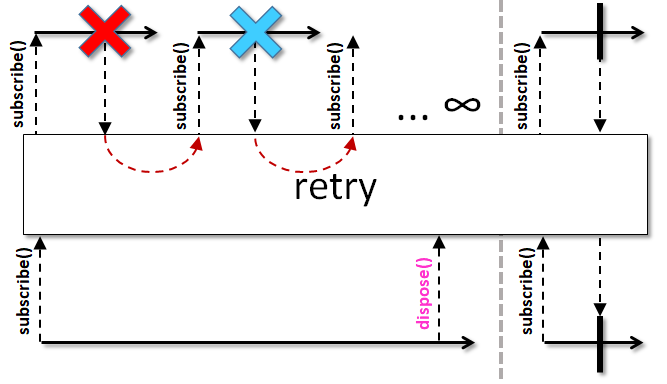 *
*
* - Scheduler:
* - {@code retry} does not operate by default on a particular {@link Scheduler}.
*
* @return the new Completable instance
*/
@CheckReturnValue
@SchedulerSupport(SchedulerSupport.NONE)
public final Completable retry() {
return fromPublisher(toFlowable().retry());
}
/**
* Returns a Completable that retries this Completable in case of an error as long as the predicate
* returns true.
*
* 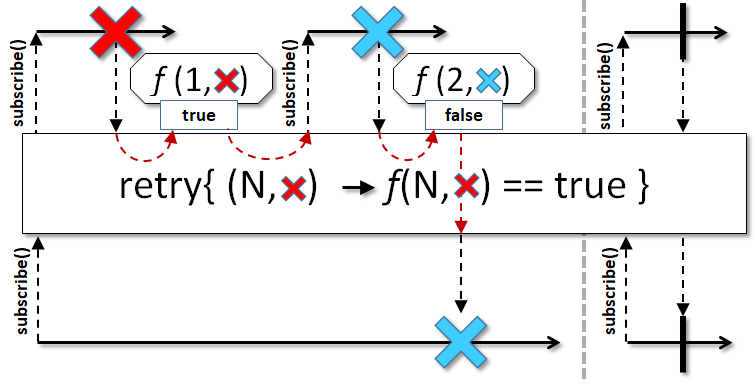 *
*
* - Scheduler:
* - {@code retry} does not operate by default on a particular {@link Scheduler}.
*
* @param predicate the predicate called when this emits an error with the repeat count and the latest exception
* and should return true to retry.
* @return the new Completable instance
*/
@CheckReturnValue
@SchedulerSupport(SchedulerSupport.NONE)
public final Completable retry(BiPredicate predicate) {
return fromPublisher(toFlowable().retry(predicate));
}
/**
* Returns a Completable that when this Completable emits an error, retries at most the given
* number of times before giving up and emitting the last error.
*
* 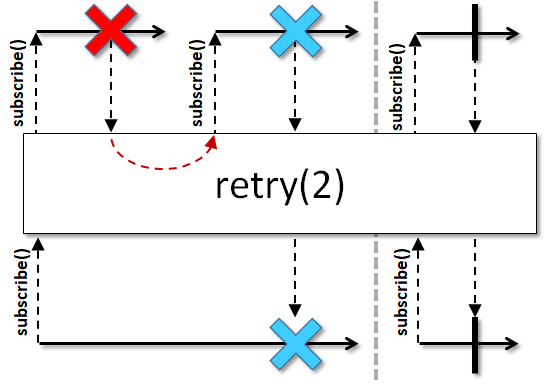 *
*
* - Scheduler:
* - {@code retry} does not operate by default on a particular {@link Scheduler}.
*
* @param times the number of times to resubscribe if the current Completable fails
* @return the new Completable instance
* @throws IllegalArgumentException if times is negative
*/
@CheckReturnValue
@SchedulerSupport(SchedulerSupport.NONE)
public final Completable retry(long times) {
return fromPublisher(toFlowable().retry(times));
}
/**
* Returns a Completable that when this Completable emits an error, retries at most times
* or until the predicate returns false, whichever happens first and emitting the last error.
*
* 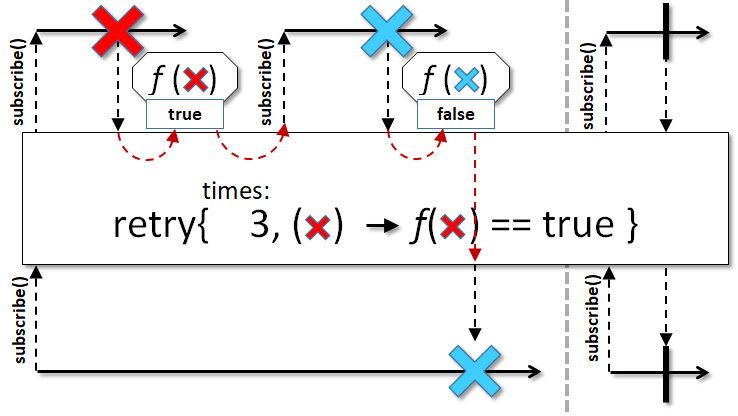 *
*
* - Scheduler:
* - {@code retry} does not operate by default on a particular {@link Scheduler}.
*
* History: 2.1.8 - experimental
* @param times the number of times to resubscribe if the current Completable fails
* @param predicate the predicate that is called with the latest throwable and should return
* true to indicate the returned Completable should resubscribe to this Completable.
* @return the new Completable instance
* @throws NullPointerException if predicate is null
* @throws IllegalArgumentException if times is negative
* @since 2.2
*/
@CheckReturnValue
@SchedulerSupport(SchedulerSupport.NONE)
public final Completable retry(long times, Predicate predicate) {
return fromPublisher(toFlowable().retry(times, predicate));
}
/**
* Returns a Completable that when this Completable emits an error, calls the given predicate with
* the latest exception to decide whether to resubscribe to this or not.
*
* 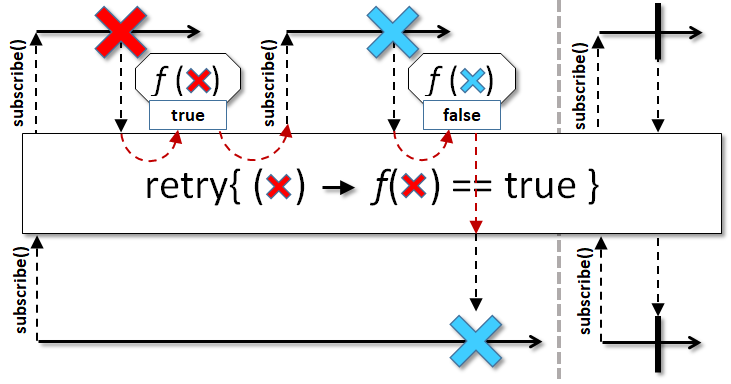 *
*
* - Scheduler:
* - {@code retry} does not operate by default on a particular {@link Scheduler}.
*
* @param predicate the predicate that is called with the latest throwable and should return
* true to indicate the returned Completable should resubscribe to this Completable.
* @return the new Completable instance
* @throws NullPointerException if predicate is null
*/
@CheckReturnValue
@SchedulerSupport(SchedulerSupport.NONE)
public final Completable retry(Predicate predicate) {
return fromPublisher(toFlowable().retry(predicate));
}
/**
* Returns a Completable which given a Publisher and when this Completable emits an error, delivers
* that error through a Flowable and the Publisher should signal a value indicating a retry in response
* or a terminal event indicating a termination.
*
* 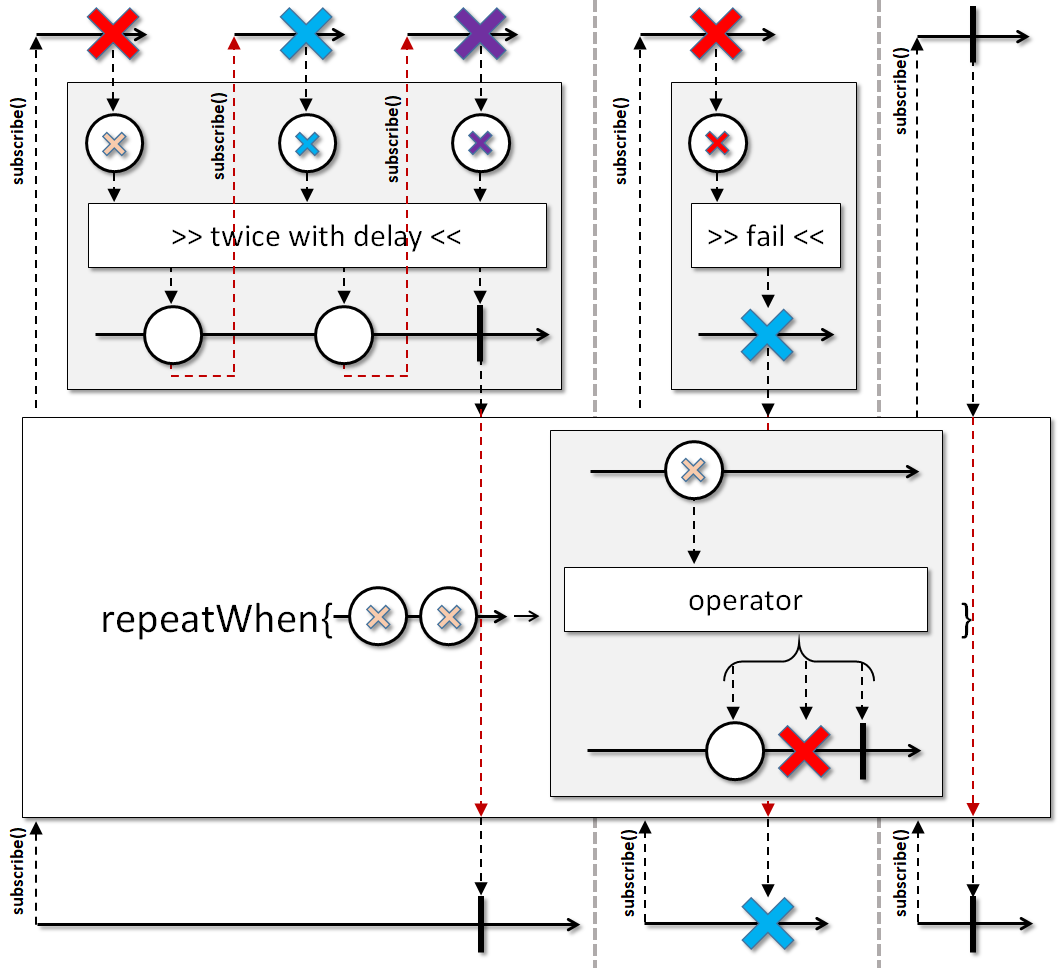 *
*
* Note that the inner {@code Publisher} returned by the handler function should signal
* either {@code onNext}, {@code onError} or {@code onComplete} in response to the received
* {@code Throwable} to indicate the operator should retry or terminate. If the upstream to
* the operator is asynchronous, signalling onNext followed by onComplete immediately may
* result in the sequence to be completed immediately. Similarly, if this inner
* {@code Publisher} signals {@code onError} or {@code onComplete} while the upstream is
* active, the sequence is terminated with the same signal immediately.
*
* The following example demonstrates how to retry an asynchronous source with a delay:
*
* Completable.timer(1, TimeUnit.SECONDS)
* .doOnSubscribe(s -> System.out.println("subscribing"))
* .doOnComplete(() -> { throw new RuntimeException(); })
* .retryWhen(errors -> {
* AtomicInteger counter = new AtomicInteger();
* return errors
* .takeWhile(e -> counter.getAndIncrement() != 3)
* .flatMap(e -> {
* System.out.println("delay retry by " + counter.get() + " second(s)");
* return Flowable.timer(counter.get(), TimeUnit.SECONDS);
* });
* })
* .blockingAwait();
*
*
* - Scheduler:
* - {@code retryWhen} does not operate by default on a particular {@link Scheduler}.
*
* @param handler the handler that receives a Flowable delivering Throwables and should return a Publisher that
* emits items to indicate retries or emits terminal events to indicate termination.
* @return the new Completable instance
* @throws NullPointerException if handler is null
*/
@CheckReturnValue
@SchedulerSupport(SchedulerSupport.NONE)
public final Completable retryWhen(Function, ? extends Publisher> handler) {
return fromPublisher(toFlowable().retryWhen(handler));
}
/**
* Returns a Completable which first runs the other Completable
* then this completable if the other completed normally.
*
* 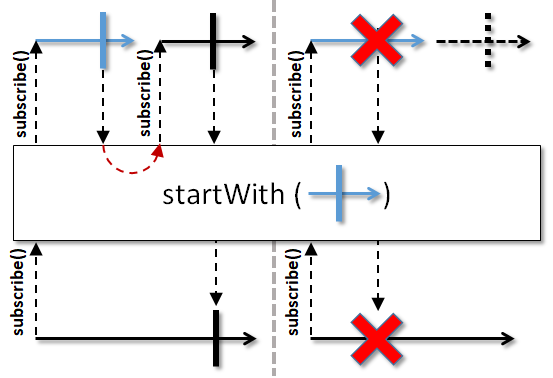 *
*
* - Scheduler:
* - {@code startWith} does not operate by default on a particular {@link Scheduler}.
*
* @param other the other completable to run first
* @return the new Completable instance
* @throws NullPointerException if other is null
*/
@CheckReturnValue
@NonNull
@SchedulerSupport(SchedulerSupport.NONE)
public final Completable startWith(CompletableSource other) {
ObjectHelper.requireNonNull(other, "other is null");
return concatArray(other, this);
}
/**
* Returns an Observable which first delivers the events
* of the other Observable then runs this CompletableConsumable.
*
* 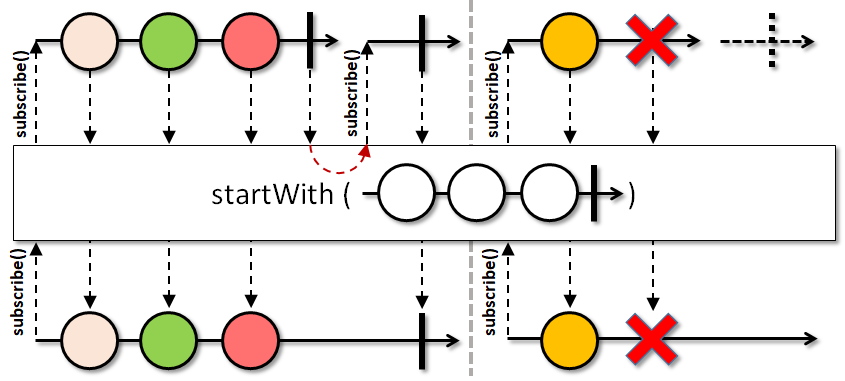 *
*
* - Scheduler:
* - {@code startWith} does not operate by default on a particular {@link Scheduler}.
*
* @param the value type
* @param other the other Observable to run first
* @return the new Observable instance
* @throws NullPointerException if other is null
*/
@CheckReturnValue
@NonNull
@SchedulerSupport(SchedulerSupport.NONE)
public final Observable startWith(Observable other) {
ObjectHelper.requireNonNull(other, "other is null");
return other.concatWith(this.toObservable());
}
/**
* Returns a Flowable which first delivers the events
* of the other Publisher then runs this Completable.
*
* 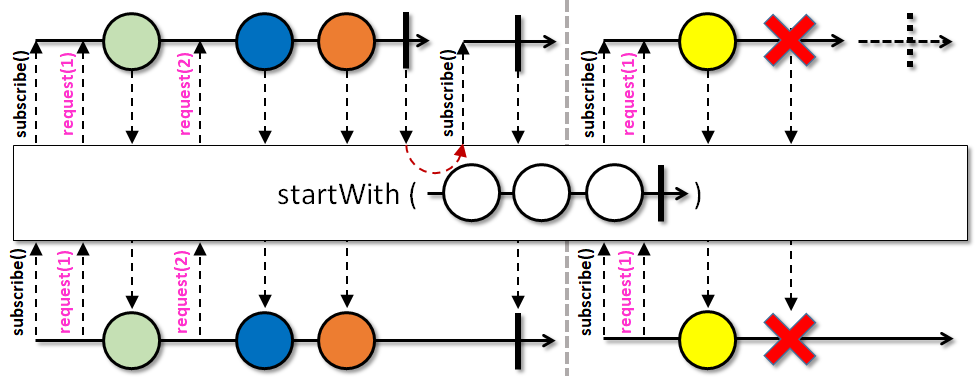 *
*
* - Backpressure:
* - The returned {@code Flowable} honors the backpressure of the downstream consumer
* and expects the other {@code Publisher} to honor it as well.
* - Scheduler:
* - {@code startWith} does not operate by default on a particular {@link Scheduler}.
*
* @param the value type
* @param other the other Publisher to run first
* @return the new Flowable instance
* @throws NullPointerException if other is null
*/
@CheckReturnValue
@NonNull
@BackpressureSupport(BackpressureKind.FULL)
@SchedulerSupport(SchedulerSupport.NONE)
public final Flowable startWith(Publisher other) {
ObjectHelper.requireNonNull(other, "other is null");
return this.toFlowable().startWith(other);
}
/**
* Hides the identity of this Completable and its Disposable.
*
* 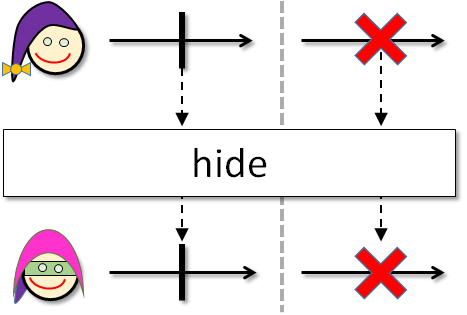 *
*
* Allows preventing certain identity-based optimizations (fusion).
*
* - Scheduler:
* - {@code hide} does not operate by default on a particular {@link Scheduler}.
*
* History: 2.0.5 - experimental
* @return the new Completable instance
* @since 2.1
*/
@CheckReturnValue
@SchedulerSupport(SchedulerSupport.NONE)
public final Completable hide() {
return RxJavaPlugins.onAssembly(new CompletableHide(this));
}
/**
* Subscribes to this CompletableConsumable and returns a Disposable which can be used to dispose
* the subscription.
*
* 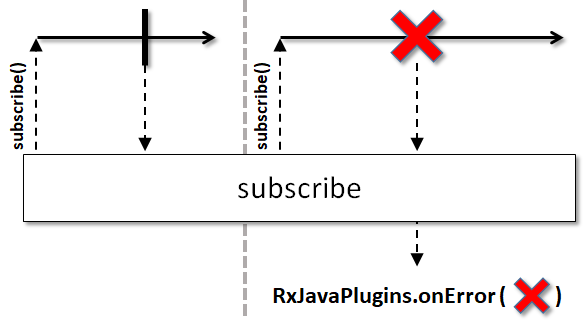 *
*
* - Scheduler:
* - {@code subscribe} does not operate by default on a particular {@link Scheduler}.
*
* @return the Disposable that allows disposing the subscription
*/
@SchedulerSupport(SchedulerSupport.NONE)
public final Disposable subscribe() {
EmptyCompletableObserver observer = new EmptyCompletableObserver();
subscribe(observer);
return observer;
}
@SchedulerSupport(SchedulerSupport.NONE)
@Override
public final void subscribe(CompletableObserver observer) {
ObjectHelper.requireNonNull(observer, "observer is null");
try {
observer = RxJavaPlugins.onSubscribe(this, observer);
ObjectHelper.requireNonNull(observer, "The RxJavaPlugins.onSubscribe hook returned a null CompletableObserver. Please check the handler provided to RxJavaPlugins.setOnCompletableSubscribe for invalid null returns. Further reading: https://github.com/ReactiveX/RxJava/wiki/Plugins");
subscribeActual(observer);
} catch (NullPointerException ex) { // NOPMD
throw ex;
} catch (Throwable ex) {
Exceptions.throwIfFatal(ex);
RxJavaPlugins.onError(ex);
throw toNpe(ex);
}
}
/**
* Implement this method to handle the incoming {@link CompletableObserver}s and
* perform the business logic in your operator.
* There is no need to call any of the plugin hooks on the current {@code Completable} instance or
* the {@code CompletableObserver}; all hooks and basic safeguards have been
* applied by {@link #subscribe(CompletableObserver)} before this method gets called.
* @param observer the CompletableObserver instance, never null
*/
protected abstract void subscribeActual(CompletableObserver observer);
/**
* Subscribes a given CompletableObserver (subclass) to this Completable and returns the given
* CompletableObserver as is.
*
* 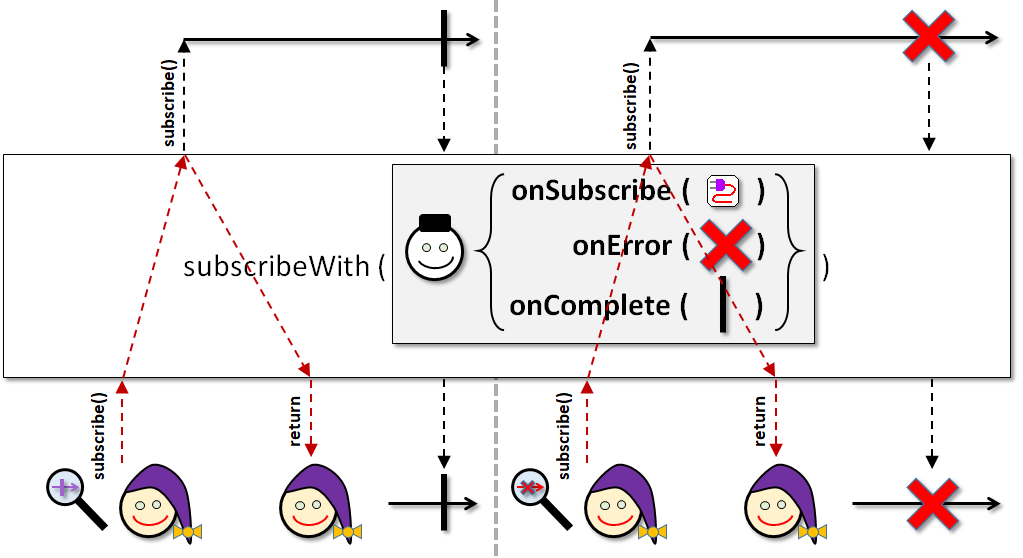 *
*
Usage example:
*
* Completable source = Completable.complete().delay(1, TimeUnit.SECONDS);
* CompositeDisposable composite = new CompositeDisposable();
*
* DisposableCompletableObserver ds = new DisposableCompletableObserver() {
* // ...
* };
*
* composite.add(source.subscribeWith(ds));
*
*
* - Scheduler:
* - {@code subscribeWith} does not operate by default on a particular {@link Scheduler}.
*
* @param the type of the CompletableObserver to use and return
* @param observer the CompletableObserver (subclass) to use and return, not null
* @return the input {@code observer}
* @throws NullPointerException if {@code observer} is null
* @since 2.0
*/
@CheckReturnValue
@SchedulerSupport(SchedulerSupport.NONE)
public final E subscribeWith(E observer) {
subscribe(observer);
return observer;
}
/**
* Subscribes to this Completable and calls back either the onError or onComplete functions.
*
* 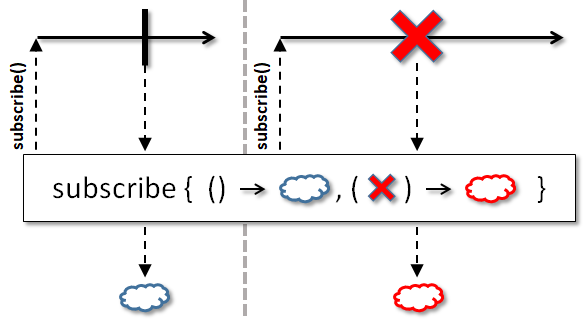 *
*
* - Scheduler:
* - {@code subscribe} does not operate by default on a particular {@link Scheduler}.
*
* @param onComplete the runnable that is called if the Completable completes normally
* @param onError the consumer that is called if this Completable emits an error
* @return the Disposable that can be used for disposing the subscription asynchronously
* @throws NullPointerException if either callback is null
*/
@CheckReturnValue
@NonNull
@SchedulerSupport(SchedulerSupport.NONE)
public final Disposable subscribe(final Action onComplete, final Consumer onError) {
ObjectHelper.requireNonNull(onError, "onError is null");
ObjectHelper.requireNonNull(onComplete, "onComplete is null");
CallbackCompletableObserver observer = new CallbackCompletableObserver(onError, onComplete);
subscribe(observer);
return observer;
}
/**
* Subscribes to this Completable and calls the given Action when this Completable
* completes normally.
*
* 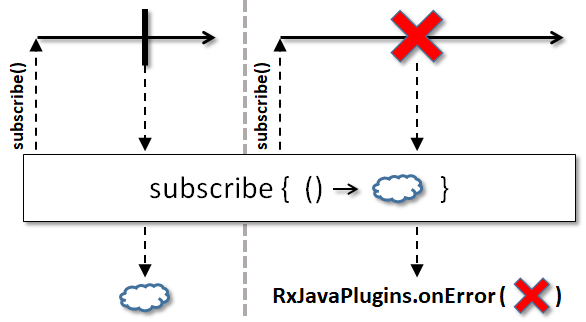 *
*
* If the Completable emits an error, it is wrapped into an
* {@link io.reactivex.exceptions.OnErrorNotImplementedException OnErrorNotImplementedException}
* and routed to the RxJavaPlugins.onError handler.
*
* - Scheduler:
* - {@code subscribe} does not operate by default on a particular {@link Scheduler}.
*
* @param onComplete the runnable called when this Completable completes normally
* @return the Disposable that allows disposing the subscription
*/
@CheckReturnValue
@NonNull
@SchedulerSupport(SchedulerSupport.NONE)
public final Disposable subscribe(final Action onComplete) {
ObjectHelper.requireNonNull(onComplete, "onComplete is null");
CallbackCompletableObserver observer = new CallbackCompletableObserver(onComplete);
subscribe(observer);
return observer;
}
/**
* Returns a Completable which subscribes the child subscriber on the specified scheduler, making
* sure the subscription side-effects happen on that specific thread of the scheduler.
*
* 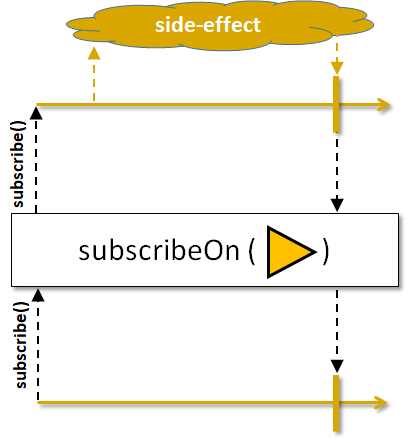 *
*
* - Scheduler:
* - {@code subscribeOn} operates on a {@link Scheduler} you specify.
*
* @param scheduler the Scheduler to subscribe on
* @return the new Completable instance
* @throws NullPointerException if scheduler is null
*/
@CheckReturnValue
@NonNull
@SchedulerSupport(SchedulerSupport.CUSTOM)
public final Completable subscribeOn(final Scheduler scheduler) {
ObjectHelper.requireNonNull(scheduler, "scheduler is null");
return RxJavaPlugins.onAssembly(new CompletableSubscribeOn(this, scheduler));
}
/**
* Terminates the downstream if this or the other {@code Completable}
* terminates (wins the termination race) while disposing the connection to the losing source.
*
* 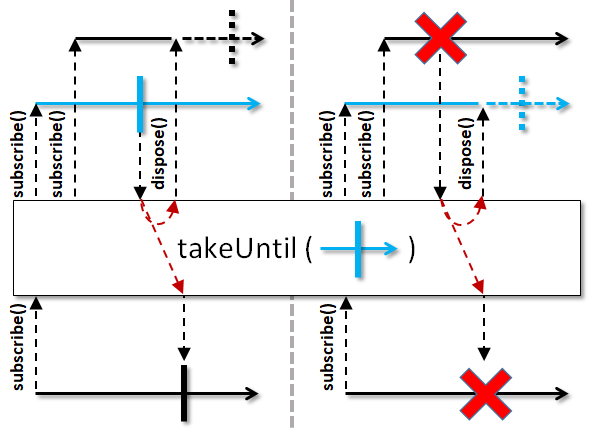 *
*
* - Scheduler:
* - {@code takeUntil} does not operate by default on a particular {@link Scheduler}.
* - Error handling:
* - If both this and the other sources signal an error, only one of the errors
* is signaled to the downstream and the other error is signaled to the global
* error handler via {@link RxJavaPlugins#onError(Throwable)}.
*
* History: 2.1.17 - experimental
* @param other the other completable source to observe for the terminal signals
* @return the new Completable instance
* @since 2.2
*/
@CheckReturnValue
@NonNull
@SchedulerSupport(SchedulerSupport.NONE)
public final Completable takeUntil(CompletableSource other) {
ObjectHelper.requireNonNull(other, "other is null");
return RxJavaPlugins.onAssembly(new CompletableTakeUntilCompletable(this, other));
}
/**
* Returns a Completable that runs this Completable and emits a TimeoutException in case
* this Completable doesn't complete within the given time.
*
* 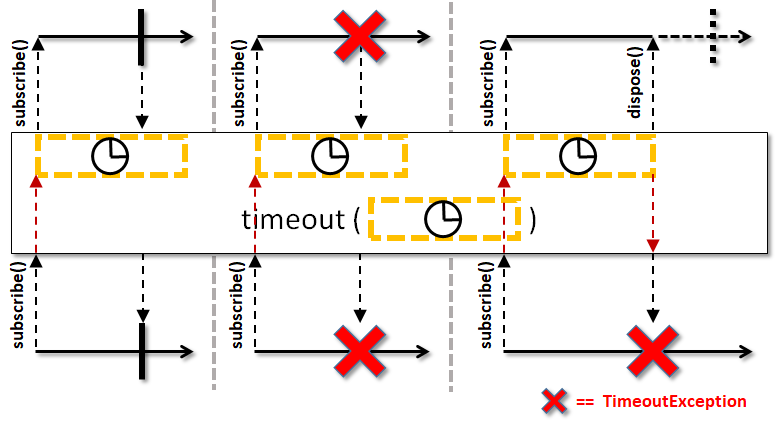 *
*
* - Scheduler:
* - {@code timeout} signals the TimeoutException on the {@code computation} {@link Scheduler}.
*
* @param timeout the timeout value
* @param unit the timeout unit
* @return the new Completable instance
* @throws NullPointerException if unit is null
*/
@CheckReturnValue
@SchedulerSupport(SchedulerSupport.COMPUTATION)
public final Completable timeout(long timeout, TimeUnit unit) {
return timeout0(timeout, unit, Schedulers.computation(), null);
}
/**
* Returns a Completable that runs this Completable and switches to the other Completable
* in case this Completable doesn't complete within the given time.
*
* 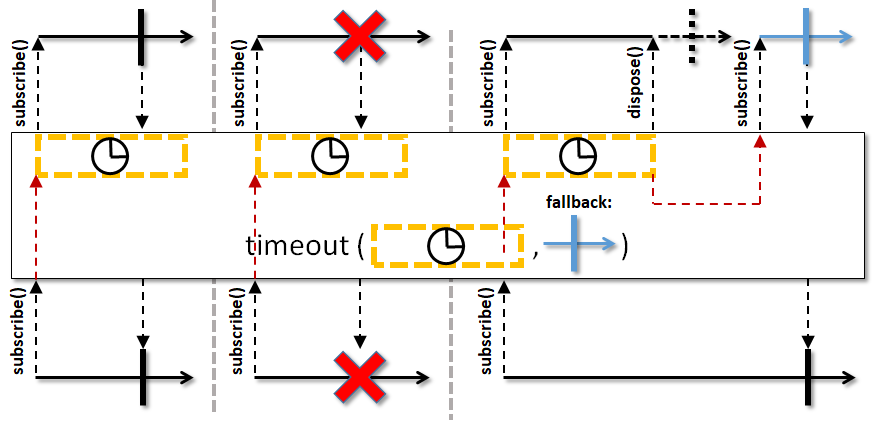 *
*
* - Scheduler:
* - {@code timeout} subscribes to the other CompletableSource on
* the {@code computation} {@link Scheduler}.
*
* @param timeout the timeout value
* @param unit the timeout unit
* @param other the other Completable instance to switch to in case of a timeout
* @return the new Completable instance
* @throws NullPointerException if unit or other is null
*/
@CheckReturnValue
@NonNull
@SchedulerSupport(SchedulerSupport.COMPUTATION)
public final Completable timeout(long timeout, TimeUnit unit, CompletableSource other) {
ObjectHelper.requireNonNull(other, "other is null");
return timeout0(timeout, unit, Schedulers.computation(), other);
}
/**
* Returns a Completable that runs this Completable and emits a TimeoutException in case
* this Completable doesn't complete within the given time while "waiting" on the specified
* Scheduler.
*
* 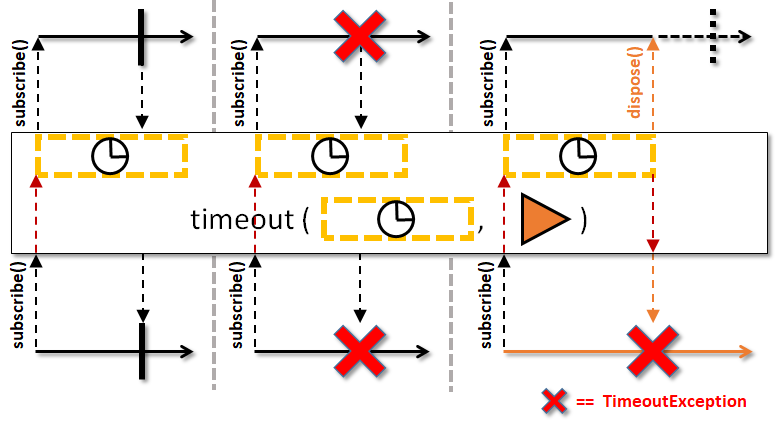 *
*
* - Scheduler:
* - {@code timeout} signals the TimeoutException on the {@link Scheduler} you specify.
*
* @param timeout the timeout value
* @param unit the timeout unit
* @param scheduler the scheduler to use to wait for completion
* @return the new Completable instance
* @throws NullPointerException if unit or scheduler is null
*/
@CheckReturnValue
@SchedulerSupport(SchedulerSupport.CUSTOM)
public final Completable timeout(long timeout, TimeUnit unit, Scheduler scheduler) {
return timeout0(timeout, unit, scheduler, null);
}
/**
* Returns a Completable that runs this Completable and switches to the other Completable
* in case this Completable doesn't complete within the given time while "waiting" on
* the specified scheduler.
*
* 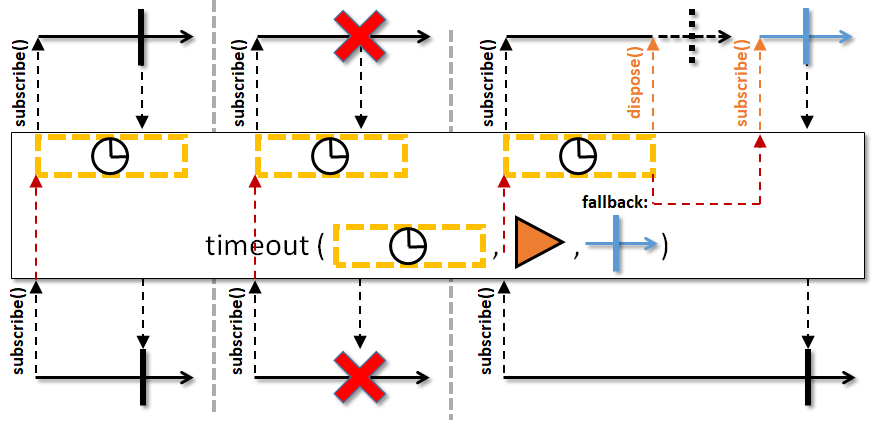 *
*
* - Scheduler:
* - {@code timeout} subscribes to the other CompletableSource on
* the {@link Scheduler} you specify.
*
* @param timeout the timeout value
* @param unit the timeout unit
* @param scheduler the scheduler to use to wait for completion
* @param other the other Completable instance to switch to in case of a timeout
* @return the new Completable instance
* @throws NullPointerException if unit, scheduler or other is null
*/
@CheckReturnValue
@NonNull
@SchedulerSupport(SchedulerSupport.CUSTOM)
public final Completable timeout(long timeout, TimeUnit unit, Scheduler scheduler, CompletableSource other) {
ObjectHelper.requireNonNull(other, "other is null");
return timeout0(timeout, unit, scheduler, other);
}
/**
* Returns a Completable that runs this Completable and optionally switches to the other Completable
* in case this Completable doesn't complete within the given time while "waiting" on
* the specified scheduler.
*
* - Scheduler:
* - You specify the {@link Scheduler} this operator runs on.
*
* @param timeout the timeout value
* @param unit the timeout unit
* @param scheduler the scheduler to use to wait for completion
* @param other the other Completable instance to switch to in case of a timeout,
* if null a TimeoutException is emitted instead
* @return the new Completable instance
* @throws NullPointerException if unit or scheduler
*/
@CheckReturnValue
@NonNull
@SchedulerSupport(SchedulerSupport.CUSTOM)
private Completable timeout0(long timeout, TimeUnit unit, Scheduler scheduler, CompletableSource other) {
ObjectHelper.requireNonNull(unit, "unit is null");
ObjectHelper.requireNonNull(scheduler, "scheduler is null");
return RxJavaPlugins.onAssembly(new CompletableTimeout(this, timeout, unit, scheduler, other));
}
/**
* Allows fluent conversion to another type via a function callback.
*
* 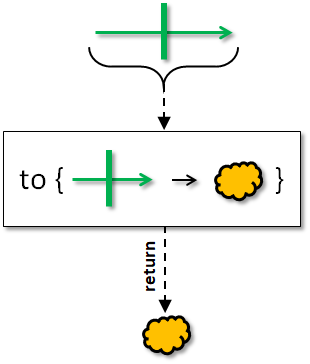 *
*
* - Scheduler:
* - {@code to} does not operate by default on a particular {@link Scheduler}.
*
* @param the output type
* @param converter the function called with this which should return some other value.
* @return the converted value
* @throws NullPointerException if converter is null
*/
@CheckReturnValue
@SchedulerSupport(SchedulerSupport.NONE)
public final U to(Function converter) {
try {
return ObjectHelper.requireNonNull(converter, "converter is null").apply(this);
} catch (Throwable ex) {
Exceptions.throwIfFatal(ex);
throw ExceptionHelper.wrapOrThrow(ex);
}
}
/**
* Returns a Flowable which when subscribed to subscribes to this Completable and
* relays the terminal events to the subscriber.
*
* 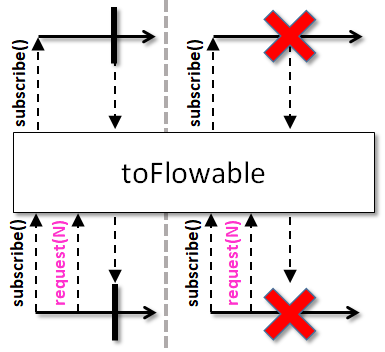 *
*
* - Backpressure:
* - The returned {@code Flowable} honors the backpressure of the downstream consumer.
* - Scheduler:
* - {@code toFlowable} does not operate by default on a particular {@link Scheduler}.
*
* @param the value type
* @return the new Flowable instance
*/
@CheckReturnValue
@SuppressWarnings("unchecked")
@BackpressureSupport(BackpressureKind.FULL)
@SchedulerSupport(SchedulerSupport.NONE)
public final Flowable toFlowable() {
if (this instanceof FuseToFlowable) {
return ((FuseToFlowable)this).fuseToFlowable();
}
return RxJavaPlugins.onAssembly(new CompletableToFlowable(this));
}
/**
* Converts this Completable into a {@link Maybe}.
*
* 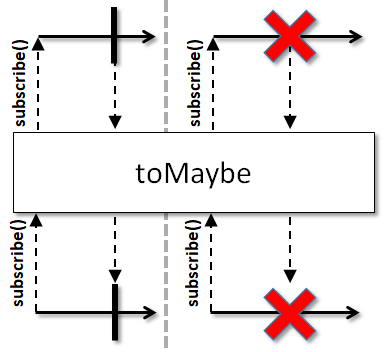 *
*
* - Scheduler:
* - {@code toMaybe} does not operate by default on a particular {@link Scheduler}.
*
*
* @param the value type
* @return a {@link Maybe} that only calls {@code onComplete} or {@code onError}, based on which one is
* called by the source Completable.
*/
@CheckReturnValue
@SuppressWarnings("unchecked")
@SchedulerSupport(SchedulerSupport.NONE)
public final Maybe toMaybe() {
if (this instanceof FuseToMaybe) {
return ((FuseToMaybe)this).fuseToMaybe();
}
return RxJavaPlugins.onAssembly(new MaybeFromCompletable(this));
}
/**
* Returns an Observable which when subscribed to subscribes to this Completable and
* relays the terminal events to the subscriber.
*
* 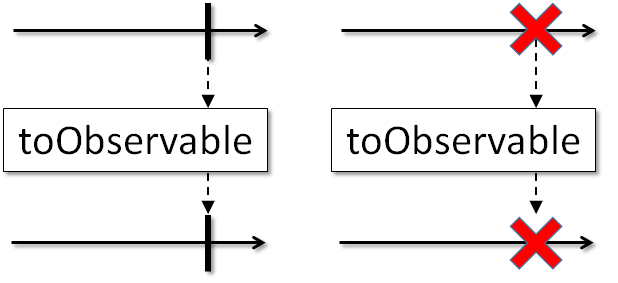 *
*
* - Scheduler:
* - {@code toObservable} does not operate by default on a particular {@link Scheduler}.
*
* @param the value type
* @return the new Observable created
*/
@CheckReturnValue
@SuppressWarnings("unchecked")
@SchedulerSupport(SchedulerSupport.NONE)
public final Observable toObservable() {
if (this instanceof FuseToObservable) {
return ((FuseToObservable)this).fuseToObservable();
}
return RxJavaPlugins.onAssembly(new CompletableToObservable(this));
}
/**
* Converts this Completable into a Single which when this Completable completes normally,
* calls the given supplier and emits its returned value through onSuccess.
*
* 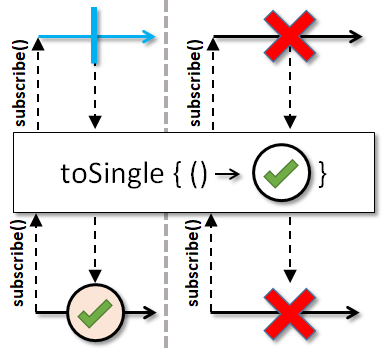 *
*
* - Scheduler:
* - {@code toSingle} does not operate by default on a particular {@link Scheduler}.
*
* @param the value type
* @param completionValueSupplier the value supplier called when this Completable completes normally
* @return the new Single instance
* @throws NullPointerException if completionValueSupplier is null
*/
@CheckReturnValue
@NonNull
@SchedulerSupport(SchedulerSupport.NONE)
public final Single toSingle(final Callable completionValueSupplier) {
ObjectHelper.requireNonNull(completionValueSupplier, "completionValueSupplier is null");
return RxJavaPlugins.onAssembly(new CompletableToSingle(this, completionValueSupplier, null));
}
/**
* Converts this Completable into a Single which when this Completable completes normally,
* emits the given value through onSuccess.
*
* 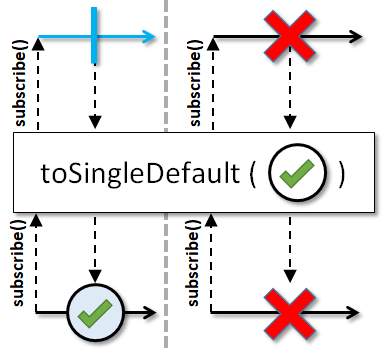 *
*
* - Scheduler:
* - {@code toSingleDefault} does not operate by default on a particular {@link Scheduler}.
*
* @param the value type
* @param completionValue the value to emit when this Completable completes normally
* @return the new Single instance
* @throws NullPointerException if completionValue is null
*/
@CheckReturnValue
@NonNull
@SchedulerSupport(SchedulerSupport.NONE)
public final Single toSingleDefault(final T completionValue) {
ObjectHelper.requireNonNull(completionValue, "completionValue is null");
return RxJavaPlugins.onAssembly(new CompletableToSingle(this, null, completionValue));
}
/**
* Returns a Completable which makes sure when a subscriber disposes the subscription, the
* dispose is called on the specified scheduler.
*
* 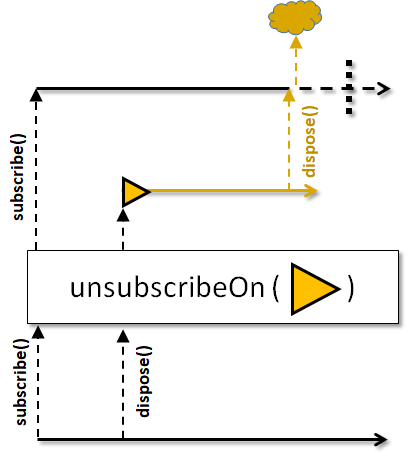 *
*
* - Scheduler:
* - {@code unsubscribeOn} calls dispose() of the upstream on the {@link Scheduler} you specify.
*
* @param scheduler the target scheduler where to execute the disposing
* @return the new Completable instance
* @throws NullPointerException if scheduler is null
*/
@CheckReturnValue
@NonNull
@SchedulerSupport(SchedulerSupport.CUSTOM)
public final Completable unsubscribeOn(final Scheduler scheduler) {
ObjectHelper.requireNonNull(scheduler, "scheduler is null");
return RxJavaPlugins.onAssembly(new CompletableDisposeOn(this, scheduler));
}
// -------------------------------------------------------------------------
// Fluent test support, super handy and reduces test preparation boilerplate
// -------------------------------------------------------------------------
/**
* Creates a TestObserver and subscribes
* it to this Completable.
*
* 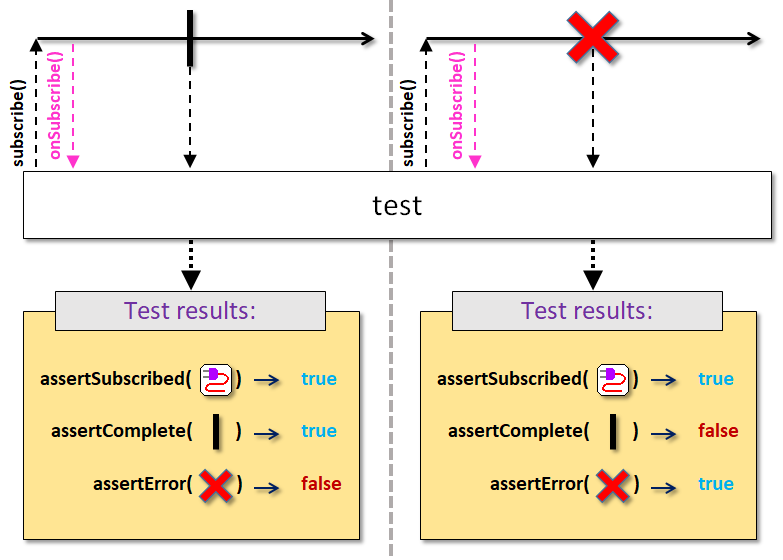 *
*
* - Scheduler:
* - {@code test} does not operate by default on a particular {@link Scheduler}.
*
* @return the new TestObserver instance
* @since 2.0
*/
@CheckReturnValue
@SchedulerSupport(SchedulerSupport.NONE)
public final TestObserver test() {
TestObserver to = new TestObserver();
subscribe(to);
return to;
}
/**
* Creates a TestObserver optionally in cancelled state, then subscribes it to this Completable.
* @param cancelled if true, the TestObserver will be cancelled before subscribing to this
* Completable.
*
* 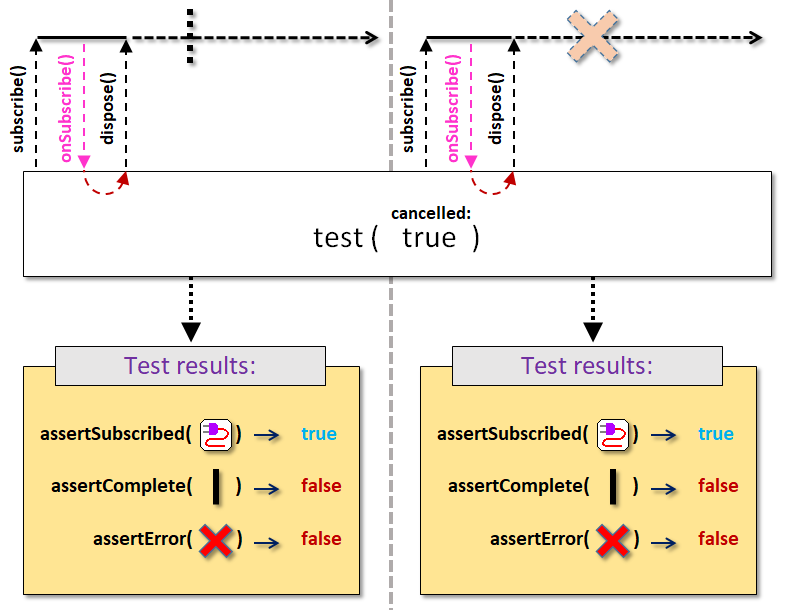 *
*
* - Scheduler:
* - {@code test} does not operate by default on a particular {@link Scheduler}.
*
* @return the new TestObserver instance
* @since 2.0
*/
@CheckReturnValue
@SchedulerSupport(SchedulerSupport.NONE)
public final TestObserver test(boolean cancelled) {
TestObserver to = new TestObserver();
if (cancelled) {
to.cancel();
}
subscribe(to);
return to;
}
}
